#because a poll is a great decision maker
Text
So TAG meets LOTR... 📚
So what started as a jest has actually become quite an involved conversation! If you haven't seen the original it can be found here: https://www.tumblr.com/darkestwolfx/745511488198967296/goodness-if-this-idea-ends-up-trending-challenge
Now this isn't me saying I will write it by any means, but let's have fun whilst I debate!
I would say let's start with Scott, but I don't think there's much debate at this rate that he's Aragorn

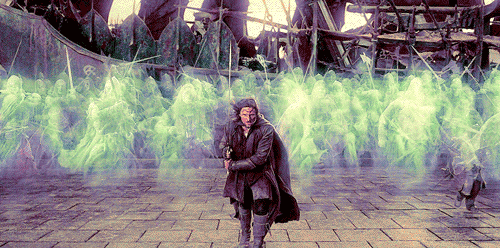
Feel free to open a debate but you challenge @idontknowreallywhy at your own risk and Wolfie is not responsible for any loss of limb 😂
So let's kick things off instead with opinions on the ladies;
And I'll add another poll in a few days time and keep these rolling until we are through everyone 🤣
Let's see what the popular castings are!
#LOTR#TAG#Thunderbirds are go#thunderfam#au#fanfiction#supportyourfanfictionauthors#ao3#darkestwolfx#poll#because a poll is a great decision maker#just a bit of a fun#eowyn#kayo#lady penelope
33 notes
·
View notes
Text
The current character list I’ve been using for the “stupid decisions” poll series: the Valar as a group, Finwë, Thingol, Fëanor, Fingolfin, Fingon, Finrod, Maedhros, Túrin and Beren and Lúthien as a pair. I’m not entirely happy with this yet, and @warrioreowynofrohan made the great suggestion of replacing someone with Celegorm and Curufin as a pair instead. (You also suggested Turgon and Morgoth, but Turgon imo isn’t as significant a player, and Morgoth is tricky because it’s kind of hard to pin down what his actual objectives are.) I don’t want to get rid of Finrod, Maedhros, Túrin or B&L, and I’ve already done the others, so unfortunately poor Fingon is going up against the murderbros! Who made the worst stupidest decisions that you’d most like to see represented in the final run-off?
In Fingon’s defence: come on the boy is the High King of impulsive recklessness! Alqualondë, Thangorodrim, the Nirnaeth!
In C&C’s defence: they had zero (0) braincells between them during the Nargothrond Debacle, we can definitely fill up a poll there.
20 notes
·
View notes
Link
In spite of what you might have heard, Democrats aren’t stupid. Nor are they spineless, cowardly, incapable of messaging, or any of the other things offered as explanations for their decades-long failure to win most elections in most places, or to secure meaningful policy reforms for their voters. In the now famous words of Marco Rubio, spoken during his campaign-ending broken robot moment on the 2016 debate stage, “Lets dispel with this fiction that Barrack Obama doesn’t know what he’s doing. He knows exactly what he’s doing.”
Yes, he does. And so does the rest of the Democratic Party. If you understand the Democrats as a party whose first priority is to win elections and then serve their voters once in office, then you have to look for far-fetched explanations for their actions, which often appear to be completely at odds with those objectives. What party eager to win over the middle of the country would repeatedly vote to make a wealthy San Francisco doyenne like Nancy Pelosi their Speaker? She’s a walking advertisement for the image of Democrats as a party of out of touch elites, more concerned with arcane speech codes than labor laws. But if you understand the Democrats as a party primarily concerned with raking in big bucks from wealthy donors, while drawing enough superficial distinctions with their opponents to maintain their identity as a separate party, then everything they do is pretty frikkin’ brilliant. Like forcing Joe Biden on their voters.
Let’s be absolutely clear: Bernie Sanders would undoubtedly have been the party’s nominee this year without the interference of its leadership. A lot of ink has been spilled about the failings of Bernie 2020, and some of those points are valid, but let’s not forget that Sanders won the first three states in the primary calendar, all while facing unprecedented hostility from the corporate media and party elites, so clearly he did a lot of things right. No other candidate has ever won the first two states without going on to secure the nomination, much less all three.
But no other candidate so universally feared and loathed by the money people and the consultant class has ever gotten so close to the big prize. Close enough that they were willing to drop all pretense of neutrality and fairness to ensure on the eve of Super Tuesday that instead of facing a fractured field of milquetoast moderates, Sanders would be going mano a mano with only Joe Biden, a man who voters had completely rejected in humiliating fashion right up until South Carolina. Remember, this was before we understood exactly how bad the coronavirus was going to be, or how badly Trump and the GOP would botch their response. No modern Democrat has ever won without high youth voter turnout, and there’s no way they didn’t understand that crushing the candidate of young voters was going to suppress their vote. Nor has any modern Democrat ever won without a high share of the Latino vote, and yet they chose to publicly and openly conspire against the candidate who was the clear choice of Latino voters.
All this in order to run a notoriously thin-skinned politician in the obvious throes of cognitive decline against the world’s most infamous bully. Without coronavirus, Biden was a sure loser and there’s no way the party’s decision makers and strategists didn’t understand that. No, they aren’t that stupid. If you consider that the battle they’re fighting is only secondarily against the GOP, and primarily against the left wing of their own party, what they did was actually very smart.
These folks can read a poll as well as anyone, and they understand that in the normal course of things their days are numbered. For years, Democrats have talked up their coalition of the ascendant; the new, young, diverse, and thoroughly blue no matter who electorate that was going to someday hand them majorities as far as the eye could see. But now that it’s on the verge of arriving, it doesn’t look quite like what they were expecting. Turns out that rising electorate wants policies that will actually allow them to rise in more than a symbolic sense and isn’t quite as satisfied by platitudes and kente cloth as the old white liberal coalition was. They want universal health care, they want higher wages, they want student loan forgiveness, they want free college; in other words, they want the people they vote for to do something for them beyond diversifying their office staff. The problem for Democrats is that all the things they want them to do are a direct threat to the grift they’ve been running since the day Bill Clinton formally announced the death of the party’s animating FDR spirit by proudly informing the public that “the days of big government are over.” The Reaganite small government ethos that’s ruled both parties ever since, simply cannot be reconciled with the demands of voters whose first priority is economic justice. So what do you do when your base sees through the hollowness of your politics and demands that you do better? Find a different base. And that’s where Joe Biden comes in.
The Biden campaign is a Trojan horse in the truest sense: it’s an empty vessel through which the Dems are attempting to substitute a portion of the GOP’s base for a portion of their own. The Democrats gearing their message towards white, professional class suburban voters is nothing new. They’ve been doing it for at least 30 years, first winning over the socially liberal/economically conservative “Rockefeller Republicans” in order to make up for their losses with union voters in the wake of NAFTA. Now they’re attempting with this election to win over the even more conservative “moderate Republicans” of this generation by running the kind of candidate who would promise in the midst of a pandemic and an ongoing populist uprising to veto Medicare for All, and not raise taxes on anyone making less than $400K a year. They’re not worried about handing over control of the party to Republicans in the process, because a Democratic Party dominated by moderate Republicans doesn’t look very different from what we have now – there’s hardly a shade of difference between your average liberal and your average “Never Trumper” ideologically.
The rising left, however, is an existential threat to the party’s modern make-up, ideology, and standard operating procedures. If they lose to Trump while trying to make the shift, something that was almost guaranteed at the time they decided to force Biden down the country’s collective throat, that’s really not a problem. Trump is great for fundraising and his sheer awfulness takes the onus off the Dems to be much better. Just being a little better than Trump is all they really need to be for as long as he’s in office. Seen from that perspective, Biden is a win-win. They either crush the left by assembling a new, even more conservative coalition, or they once again scapegoat the left for their losses and spend another four years pretending the country didn’t go to shit until 1/20/17. So if you’re a deeply corrupt member of the fake-left half of the country’s ruling elite, where’s the downside? It’s nothing but upside for everyone except the voters.
There’s only one flaw in this plan. It doesn’t take into account the dangers of breaking the social contract so severely that the population becomes ungovernable. Only a fool would believe that we can continue on our current course of spiraling wealth inequality combined with a collapsing quality of life, now severely exacerbated by a global pandemic, without a reckoning. Unfortunately, in keeping with their French, Chinese and Russian predecessors, our leaders are those fools. History shows us that those most in danger of getting on the wrong end of a People’s Tribunal, are always the last to see it coming. With Trump we get there a little faster, with Biden a little slower (maybe), but the American economic and political system as currently constituted is clearly unsustainable.
Vote your conscience in November in light of these realities (personally, I’m writing in Dave Chapelle), but know that the real battle is going to start the day after the voting ends.
7 notes
·
View notes
Text
#personal
My connection is super trashy this morning much like the cards I’ve been dealt in life these days. It seems like my actual turn in whatever game is in play gets ignored more blatantly. I found an old USB on the shelf cleaning a couple of days ago. On it was a copy of Rise of Skywalker, Ninku, and Blade Runner. I’ve watched Blade Runner a thousand times and never picked up on the chess game. Bishop to King Seven. A famous move I made the link to in a post here only countered by forking in tandem with the opposing knight. The Immortal Game. Sometimes if you really believed you were living in a simulation there’s magic moments such as that. To me it’s really just the poetry of my life I live with nobody else gets but me. I write about it sure. I listen to Steely Dan all day too. Nobody wants to hear from men right now I get it. Especially Jerry Saltz and the neoliberal elite. But that’s where I came from. And judging from the dead responses on LinkedIn when it comes to networking, people would rather forget I even existed. I feel like sometimes I get the hint and most of the last three months has been hobbling away from that. My generation was the first generation after the boomers to be forgotten about. We were in constant rebellion at the sheer audacity of how we were supposed to live. Subsequently we were never really designed to rise up from under that thumb unless we were part of the family. And the one thing I’ve learned from the tax hell I look at every day in my financial planning is that families definitely have more opportunities to avoid paying their fair share of taxes. I’m an only child. Never been married. Never had children. Mentored enough people to know I’d be a good father. But overlooked, ridiculed and shunned enough to feel like I’m worthless. Ironically for the first time in my life, I’m worth something on paper to a bank and a credit union. Possibly to the companies I still hold equity in. But for me it’s a very unique situation to be in. Painted in a fucking corner with nobody to tell you what to do other than your better judgement. I don’t wonder if my plan for the next year is right for the long run. The long run has been just that. Twenty years of my life just vanishing in a blink. People eerily waiting for you get the hint. Appalled at the audacity, like Terrell when Roy Batty confronts his maker. Why can’t I live? Everything out of Terrell’s mouth is an excuse. Replicants were made to serve not made to last. Every last inch of life has been accounted for and speculated against. Terrell and the makers coo that you should feel great joy you have a purpose in their eyes. And yet I’ve seen things you humans wouldn’t believe. I’ve seen everything in my old office disappear into the trash without any real confirmation. I’ve seen friends I helped through thick and thin respond cold, callous and on some sort of script fearing legal action. I’ve seen barely anyone but my neighbors between grocery drop offs. And most likely they’re just nosy.
Everyone makes sure they are in proximity of me when I crack and open up to the world. This is still people’s assumption. That I’m looking for new friends after all of this. That my vulnerability can be further speculated on. That I can still be trapped. After sitting here with no closure listening to people’s problems but having my own go completely unnoticed. Much like the replicants in Blade Runner, I have no prime directive other than to walk around and look cool in military upcycled gear. I check my LinkedIn notifications to look for jobs. There are some bright spots. Mostly in China. Everything else is a team of salesmen and recruiters looking for desperate contractors to overhaul IT departments they bought after laying off entire staff. It’s the equivalent of getting back into the market like a scab. All the salaries are the same for these kinds of jobs. And it would be a lateral move with no pay increase. These are for profit jobs. I spent twenty years in a non profit with barely a cost of living raise. That was the salary I achieved. Nielsen Gallup polls and artistic corporate analysis has stolen everything from me, including my non profit salary and made it the new normal. I was barely able to escape any sort of lifestyle creep including debt. I chewed my way out of it alone. Made to feel undesirable and worthless. Received a few lump sums after the reduction of force. And the markets are beating the war drum out there like the best thing to do is to put it all back in the hands of corporations that won’t look me in the eye to hire me. All the while, people pretend that I’m not real enough to talk to. I’m a ghost that conflicts the lies people hope no one uncovers. An inconvenient truth to even myself. And this is where the politics stop for me. I have to live like everyone else. America is on a collision course with everything these days. Ruth Bader Ginsburg was a shining light of hope for getting out of the clutches of disturbing Christian White men who treat money like a whip. Mitch McConnell is already dancing on her grave at this point. These people have no shame. Trying to push a supreme court candidate before the elections to further their political agenda. An agenda that has nothing to do with respect for freedom unless it benefits their interests and way of life. The American dream in this respect is and has always been a total lie. To be betrayed by it and left for dead is something I have already learned from. And my grand chess move is the same as it was a few weeks ago. In the meantime I sold all my blizzard stock to buy IBM while they partner with London fashion week. Even if the speculative value of my portfolio is trash, that trade confirmation went through loud and clear. We all have different values in America for sure. But the people who bought and lobbied their way into offices have little value to me.
The way things look for me, I will be sitting out until February at the earliest. I’ve budgeted myself out with health insurance. The premiums are fucking outrageous and I had a chance to open enroll two weeks before I was let go. I could have softened the financial burden if somebody would have just let me know. If I would have had any lead time I would have made some different decisions. But after twenty years, I was treated in a way that sent a real message. One that nobody seems to be able to carry the weight of other than me. It’s a unique situation. Capitalists would love to shower praise on it as being the spirit of entrepreneurship. But we all know that’s some Ayn Rand survival of the fittest bullshit. There’s two choices. You either believe the pyramid scheme and give up your money, power, and influence for the greater agenda. Or you get ostracized. Generation X in America was always an alienated group. Maybe we were the first to realize how we were being scammed. Some of us got dropped out of the nest and cracked. The Kurt Kobains that succumbed to heroin and suicide. The ground wasn’t very soft during those times. A stable job seemed like an accomplishment. Truthfully there are jobs out there that require over ten years of experience. It’s a nice option to have. A resume that actually looks like you’ve done something even if nobody wants to acknowledge you even existed. But when I look around for answers in this city I find very little. I have a safe place to stay for awhile without having to do much. I got approved for a license for Ableton Live. It’s the first time I’ve owned it. I spent last night replacing the SSD in my laptop with a terabyte drive with faster read and write speeds. With the ram upgrade I can do video and audio on the fly without blinking. I write in my sleep and I communicate organically throughout all of this. I’ve had to own my struggles and pain time and time again only to be buried. And at this point, my friends down here realize my side of the story more than most. And I’m sure it feels hurtful and hopeless to know what I’ve been through doesn’t mean all that much because I’m a Steely Dan fan. The truth is people will grasp at straws to throw stones in a glass house. Capitalism is a self destructive behavior. There’s not enough to go around to feed the hungry shareholders, the investors, the financiers, the lawyers, the useless aspects of society speculate on paper currency and not human spirit. We end up confronting it sooner or later. And the answer we get is simple. Bishop to King Seven is checkmate. You have no more moves. And I’m done hearing the excuses. I have won the game. I am simply waiting for your concession. If I have to wait all winter, please know that I’ve burnt enough bridges to stay warm. Hate to throw cold water on the plans to keep me obsolete. My incept date passed a long time ago. And while most of my past is lost in the rain, I am at least still human enough to cry. Make no mistake I shed no tears for winning. <3 Tim
2 notes
·
View notes
Text
SnK S3E17 Poll Results (Manga Reader Version)

The poll closed with 362 responses. Thank you to everyone who participated!
Please note that these are the results of the manga reader poll. Anime only watchers are suggested not to read if you do not wish to be spoiled about certain events! Anime only viewers, click here to view your poll results!
RATE THE EPISODE
354 Responses
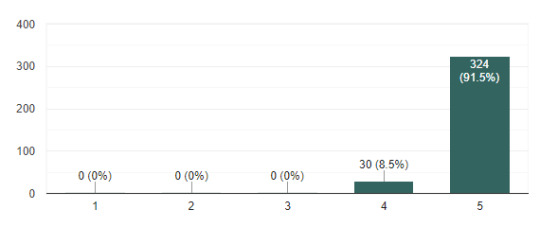
Similar to ranking systems seen outside of this poll this week, the episode has gotten a very high score, with no one voting for anything under a 4. WIT really outdid themselves with this one!
Chapter 82 is one of my top 5 favorite chapters of the series to date. This episode is top 5 of the series to date. Absolutely top notch.
Best episode of all media (and i'm not kidding!!!!) We don't deserve SNK/WIT
Absolutely amazing. I’m a manga reader who watched with an anime only. We normally discuss while watching, but even I who knew what would happen couldn’t make a sound. We were completely speechless. Amazing episode. Definitely top 3..maybe 2.
Best ep in the series. WIT and the cast absolutely delivered these past two eps.
It's great. Hats off for staffs who delivered this episode
WHICH OF THE FOLLOWING WAS YOUR FAVORITE MOMENT?
356 Responses

Levi taking out the Beast Titan was ranked as the most favored moment of the episode. Following closely behind was Armin’s sacrifice. The third most popular moment, aside from the votes of those who can’t just pick one scene, was Eren dealing the finishing blow to the Colossal Titan.
Let's not forget about the jawdropping Sawano music pieces, the music during the Armin burning scene made the scene so powerful i teared up, as well as Marlowe's monologue one!
I've waited almost two years to see Levi vs Zeke animated and it was so much more glorious and heart breaking in the anime. And the Armin scene had me in tears, every single time, which didn't happen when I read the manga. (Then again I didn't cry at all while reading manga).
I was extremely disappointed with the Levi vs Beast Titan fight, the music choice for that scene was so underwhelming and out of place, and the animation - while better than anything else in the episode - still manages to look extremely lazy.
Am I the only one who actually likes Zeke's monologue? Yes? Ok then.
I never cared much about Armin, he isn't even in my top 5 characters but his death made me cry and every time I see the scene I get emotional. Music was perfect and Inoue Marina did an amazing job.
WHO WAS THE EPISODE’S MVP?
356 Responses
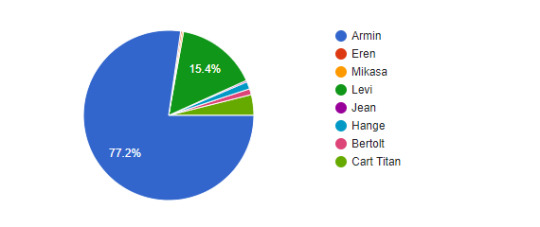
Armin easily takes the mantle as the Most Valuable Person this episode, with Levi following behind at 15.4% of the vote. In third, people voted Pieck as the MVP.
Armin is the mvp of this episode. No matter how much wit wants us to think it’s Levi with the end card, Armin is the mvp.
Levi was, is, and always will be glorious. That break in his voice, that rage... I'm in tears.
WHO’S SACRIFICE HAD MORE EMOTIONAL IMPACT ON YOU?
357 Responses

Erwin and Armin had to make choices that brought them to the brink of death. 63.9% of respondents expressed they felt more emotional for Armin’s sacrifice while 36.1% hold Erwin’s closer to their heart. We thought about adding a “both” option, but some poll makers wanted to be evil and prepare you for the next episode. >:)
I HATE the question with Erwin and Armin as the only choices btw. :( Both of them sacrificed their biggest dreams to ensure victory for humanity, and choosing one over the other downplays the strength of both of them in making their choices. That's what made serum bowl so terrible imo. I love both the characters dearly, and the entire thing is a clusterfuck of a Sophie's choice type scenario (I picked not ready for the serum bowl question, if you couldn't tell).
WHICH CHARACTER HAD THE BEST “FINAL BLOW” AGAINST THE ENEMY?
358 Responses
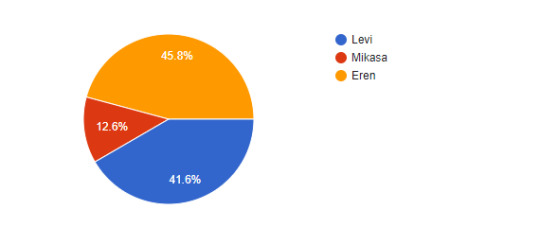
At 45.8%, Eren gets the most vote for “best final blow” for taking down the Colossal Titan, with Levi following closely behind at 41.6% with the Beast Titan.
Levi vs. Zeke was Imai at his finest, Marina killed it once again as Armin, Reiner vs. Levi Squad was incredibly satisfying, and Eren finally taking down Bert was breathtaking. This episode deserves all the praise it's getting.
Didn’t expect to be so conflicted over Eren taking down the Colossal - he finally got revenge but at what cost ;_;
Daaaaaaayyyyyuuuummmmm. Levi VS Zeke was just *chef kiss*.
WHICH WAS THE BETTER ONE LINER FROM MIKASA?
353 Responses
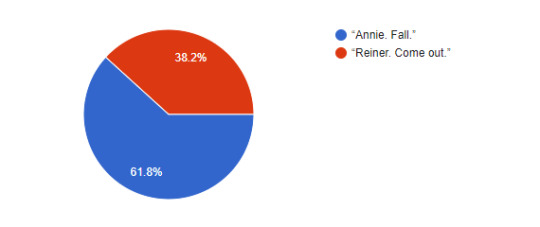
“Annie. Fall,” still remains as the more iconic pre-mortem one-liner from Mikasa.
THOUGHTS ON WIT CHOOSING TO OMIT ANY MUSIC WHEN EREN TAKES OUT BERTOLT?
355 Responses

Nearly 66% of respondents were happy with WIT’s decision to keep the environment quiet during the Colossal Titan’s takedown, allowing the audience to truly focus on the moment. 21.4% were happy with the choice but also would not object to there having been music. 9% feel that it would have had more impact with some music.
Not having any music was a parallel to back when Eren tried to kill Bertholdt in Trost and failed, also because Armin is badly wounded, not having any music gave respect to his "sacrifice"
I never consider the music of an episode beforehand and I was too into the moment to notice there wasn't any
I'm pretty confused abouy how they chose to do it, i guess i was expecting something more impactful, and the no-music, seen from afar thing didn't do it for me
I was too busy crying to notice there wasn’t music
Would’ve been perfect if the silence hadn’t been blocked by berts needless exposition imo
Sometimes silence is better than music.
850 YEARBOOK VOTE: WHO HAS THE BEST TEETH?
349 Responses
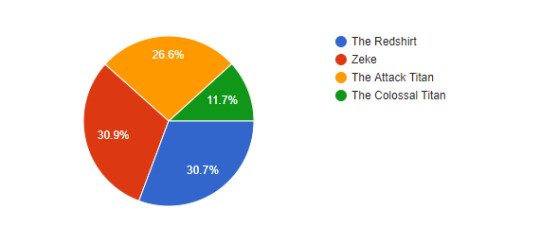
It was almost a tie, but Zeke’s teeth win the yearbook vote with 30.9% of the vote. Just behind him with 30.7% of the vote is the random redshirt that got 2 seconds too much of screen time. 26.6% feel that the Attack Titan has the best teeth. Sorry, Bertolt.
The vast amount of weird looking teeth in this episode freaked me out
WHO WORE THIS LOOK BETTER?
344 Responses


Reiner wins the most handsome look with 61.3% of the vote. But you have to admit, the resemblance is uncanny.
REINER LOOKS LIKE JAMES CHARLES IN HIS TITAN AHAHAHA
HOW WELL DID THIS EPISODE ADAPT THE CORRESPONDING CHAPTERS?
354 Responses

The majority of manga readers feel that the source material was handled extremely well this episode, with only 0.3% of respondents feeling it could have been handled better.
Mikasa taking down Reiner was definitely more badass in the manga too. Her expression is too serene here. Hange was infinitely more BAMF-y and I am very glad for this at least.
Levi vs Zeke had an amazing animation, but i didn't like Levi's slashing flurry at the end of it. It didn't make any sense
I thought I was going to be ready for that Armin scene, but it was so much more intense than the manga. I ended up crying so much.
I wish they added more emotional Levi's faces like in the manga, but it turned out pretty ok
The adaptation was pretty badass this time around imo. My roommate lost her appetite watching Armin's sacrifice
If it weren't for the perfect plot that WIT was adapting, this episode would have been one of the worst quality wise, and I wish they would have taken more time and care to adapt one of the best moments of this series.
WAS LEVI VS. ZEKE: ROUND 1 ALL YOU HOPED FOR?
357 Responses
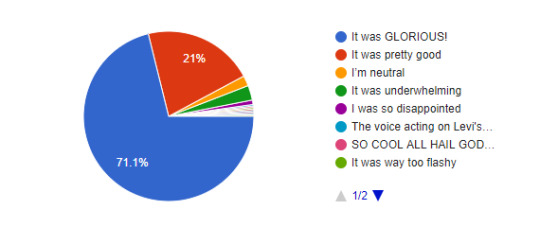
71.1% of respondents were left feeling extremely pleased with WIT’s adaptation of Levi vs. Beast Titan. 21% were happy, but perhaps not totally blown out of the water like the others. A few small groups of people are either neutral, or felt underwhelmed and/or disappointed.
This was so awesome!! Levi was so badass and damn, rage looks good on him. Zeke clearly didn't see any of it coming!
The voice acting on Levi's part was beyond what I'd hoped for so I was emotionally into it, but the over-the-top drama of the slishy-slashy moment kind of downgraded the actual visuals for me. But you know what, overall I think it was quite good - not brilliant, but good.
It was way too flashy
Zeke's monologue didn't really feel well this time. Yet, the whole scene was pretty good.
SO COOL ALL HAIL GOD LEVI!!
Couldn't fully enjoy Levi slicing Zeke now that I know he'll have him another time and fail at killing him again (with yet unknown circumstances for Levi) :c
HOW DO YOU FEEL ABOUT WIT CENSORING THE SCENE WITH LEVI’S BLADE IN ZEKE’S MOUTH?
353 Responses
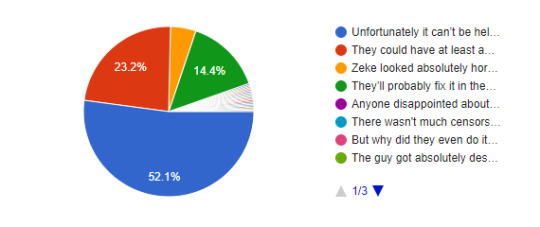
52.1% of respondents were pretty understanding of the situation, feeling that the censorship couldn’t have been avoided. 23.2% feel that they could have at least shown a little bit of sliced flesh. 14.4% are hopeful that we’ll get a more gorey version of the scene when the bluray animation comes out. A small percentage were very displeased.
Censorship is understandable all things considered, but it managed to be effective. Sometimes, your imagination makes things worse than the reality of it, such is the case here.
HE HAS SO MUCH TEETH WHY DID THEY GIVE ZEKE SO MUCH TEETH NO HUMAN BEING HAS TEETH THAT GO THAT FAR
The guy got absolutely destroyed right before, the blade still pierced his mouth, I don't give a shit.
I actually think that too much realism would be overkill for fast paced animation. They managed to keep the scenes intense and smooth and i wasn't bothered by it at all.
I was pleasantly surprised we saw the blood from the blade thrusting in his face. I don’t require more gore than that lol
i wanted to see it SO BAD ugh :rip:
Anyone disappointed about censorship in anime in 2019 isn't really knowledgeable about the industry.
I don't care, gore is cheap, snk is better than that.
HOW DID YOU FEEL SEEING ARMIN’S SACRIFICE ANIMATED?
356 Responses

Over half of the fandom felt more emotional about Armin’s sacrifice than they did reading the manga, a testament to how well WIT adapted the material, given we all know the ultimate outcome of Armin’s fate. 26.1% of respondents felt that the scene was equally moving in both mediums, while 12.6% felt more emotional while reading it happen in the manga.
Both were equally moving for sure but the anime version had that extra element of Body Horror™. Armin's skin literally melting off is something I will not forget for a long time.
Emotionally, this episode didn't get me as much as the manga did but that is mainly because I've got like 2+ years of rereading it and working through my emotions.
Armin was just as annoying with his ocean and he should've died here.
Showing the skin melting off was an absolutely brutal touch
After I read that scene I spent a lot of time thinking and mulling it over. After I watched that scene I had to pause because I couldn't see anything through my tears. They are just different types of impact, there's no way to compare them
Seeing his pants in pristine condition right after took me out of it, so probably manga > anime, but both really good
I told you I wasn’t ready. I had to watch my son melt. M e l t. He is truly a hero and I’m sobbing.
THOUGHTS ON BERTOLT’S STEAM BECOMING AN INFERNO?
353 Responses

61.8% of the fandom felt that WIT’s animation helped really put into perspective the pain that Armin was dealing with during his sacrifice. 21.% really enjoyed WIT heating up the steam attack by turning it into an inferno as a cool effect. 9.3% may have felt that it was a little too dramatic, and a small few didn’t really care either way.
The inferno made the decoy plan even better and shows how powerful bert is with his titan.
It made it even more suprising that Armin survived this
Not really consistent to 02/06 where he just emits hot steam, but whatevs.
I was willing to buy Armin miRaCulOuSlY surviving in the manga bc it was just hot steam (and a nearly 50m fall but whatever). He was literally cooked alive. He caught fire, everything was fire. He’s dead. It’ll be even worse when he’s alive and starts the serumbowl in anime form. The inferno cheapened the whole premise of that fight because there’s no way in hell that armin should’ve survived all the shit they added in the anime. Rant over.
Bert for the win
Shinganshina’s first deep fryer looked pretty cool!
DID MIKASA TAKING OUT REINER HAVE AS MUCH IMPACT AS IT DID IN THE MANGA?
353 Responses
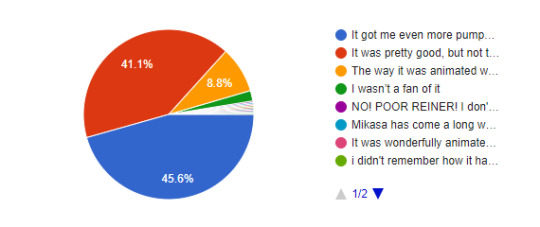
45.6% of voters felt even more excited about Mikasa delivering the final blow to Reiner than they did while reading the manga. 41.1% felt that the scene was adapted well, but that it could have been done better. 8.8% found the animation a bit awkward and didn’t enjoy the moment as much because of it.
Finally Mikasa played bigger role in the anime. She was a real badass.
The only knock that scene has is just... Mikasa get out of the mouth! There's an explosive in there! How did you not get hurt?!
Mikasa has come a long way from being picked up and carried away to safety. The girl who watched Shiganshina crumble because of this guy just stuck her whole-ass body in his mouth like nbd and blew his shit to pieces. Call that narrative satisfaction.
It was wonderfully animated, but when I read it in the manga I felt very sad for Reiner. In the anime, the music was very triumphant
I loved the fluid animation. It’s so fitting for the scene!
Yes. It simply made me cry another time for my poor Reiner
THOUGHTS ON WIT MOVING UP THE FLASHBACK SCENE OF EREN AND ARMIN BECOMING FRIENDS?
356 Responses
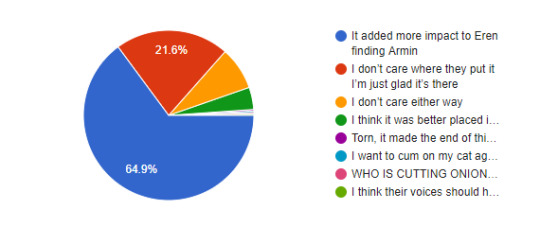
The majority of the fandom, at 64.9%, felt that moving the childhood flashback scene added more weight to Eren finding Armin’s burned body on the roof. 21.6% aren’t too concerned about the placement and are just happy to see it at all. A small amount of people felt it was better placed in the manga.
Torn, it made the end of this episode way better but might make the start of next episode a little less impactful, we'll see.
I think their voices should have been more childlike. They sounded too mature.
Baby armin is the cutest thing ever. I' m also glad they did some justice for eremin for the first time in the anime
WHO IS CUTTING ONIONS?? WHY MUST YOU HURT ME WIT?
WHICH SCENE FROM THE PREVIEW ARE YOU MOST LOOKING FORWARD TO?
354 Responses

Seeing the Yeagerbros meet for the first time won out with 37.3% of the vote. Following closely behind is the moment when Levi tries to inject Erwin with the serum. 24% of the fandom are looking forward to seeing Eren and Mikasa’s defiance once Levi realizes that he can still save Erwin.
BUT REALLY, HOW EMOTIONALLY READY ARE YOU FOR THE SERUMBOWL?
354 Responses
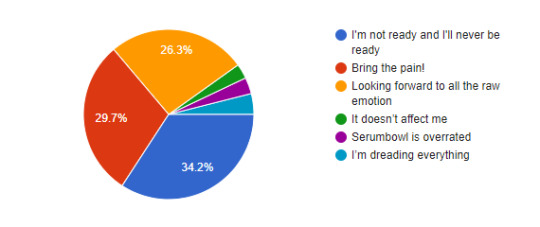
34.2% of the fandom feel the impending turmoil coming up as they watch a number of beloved characters either dying or fighting each other. 29.7% are ready to feel everything. 26.3% are looking forward to seeing the characters express their very base and raw emotions. A small few either don’t feel affected or are not really looking forward to the chapter being adapted at all.
One of my favorite characters is Bertholdt so I'm not prepared to see him begging and death next week…
I watch with two anime-only siblings, the serumbowl is going to divide the household into WW3
oh jesus oh fuck i'm not fuckin ready for serumbowl 2.0
I’ve cried so much the past three episodes. I can’t even imagine how bad next week will be.
Last week before Bert dies please no
At least the serum bowl will be dealt with in one episode and we won't need to deal with the endless cliffhanger which definitely did not contribute positively to that part of the arc. It's inevitable with a monthly manga, but man, those few months were rough.
My body is not ready, send help
ADDITIONAL THOUGHTS ON THE EPISODE?
It was so good overall! The anime continues to do a really great job in bringing life to the manga, this episode especially. Not ready for the emotional rollercoaster of next ep tho asgskdk
It was fantastic. I'm so happy with this season. But how dare you guys not give us multiple choice or "all of the above" as options on some of these
So because of the manga I was reAlly beginning to dislike Floch but seeing the survivor scene really reminded me of why his character is the way it is
Zeke’s monologue was much more terrifying than in the manga, specifically when he raged at the soldiers, it was intense. It’s really got me hyped for the next chapter. “Game set” indeed. The way they are lining this up can’t be a coincidence.
i wonder what the cart titan/pieck was doing the whole time
The preview for E18 was wayy to much spoiler imo.
Armin is MVP 5eva but also RIP the anime only fans, it's been so satisfying to see their reactions all over the interwebs
NGL, they put more in the episode than I thought. Guessing that they’ll dedicate 3-4 eps on post photo exposition
This episode was the best of them all. It brought powerful emotions and made me 100% sure that Levi made the right choice with saving Armin's life. Armin is the bravest of them all and I hope he will become a hero in the final arc of the manga. However, for now I can imagine the feelings and emotions the anime-onlies have. They didn't expect Armin to sacrifice himself and die. In the other shonens main trio always survives, while here the situation is different. However, I hope they won't be disappointed after finding out that Armin is still alive. It may feel like strong plot armor for them. Anyway, I love this episode very much!
I've never been so glad to be a manga reader. Watching this episode without knowing that Armin will be okay would have fucked me up for a long time.
I do feel that Zeke's animation turned out a little too cartoonish as he was ripped from his Titan. Which is a weird critique on an anime episode I know, but. The style seems off. Sloppy somehow. Compare this animation to the beautiful chase scene with Levi in episode 2 of part 1 of this season and it feels like two completely different animes. The VA's have done an outstanding job, though.
Armin has evolved to Arman
Can we appreciate how Bertolt was rendered in this episode? His VA did a fantastic job as always and made him more sympathetic. You could sense that Bertolt was rather chill with his monologue. At several times he wasn't ready to commit but he did anyway. Emotional parting is hard for him.rman
Marlowe's scene in chapter 81 was heartbreaking and eerie enough, but this... that shit H U R T E D
My poor heart still hurts after Armin's sacrifice. Like if you cry everytime.
No question regarding Levi vs BT ost? They used such an awesome ost for Armin's sacrifice and made the scene more epic than the manga, which made me really really happy. On the other hand, in Levi vs BT, they used such an ost which didn't even match the fight's mood. Just because of the wrong choice of ost the scene had much much lesser impact.
For me, this episode was the most anticipated from the manga ever since I read it years ago, and they delivered. It's the best so far, but I hope Blu-Ray can make it better
Like a roller coaster of emotions this show was for me, Levi's fight against Zeke put the animation on a high level if I forgot the two last episodes (because it was "meh" for me but good anyways). The promise that's still remain in force, the sacrifices in vain, three epic and decisive battles that put a semicolon in the saga AND the next episode or serum bowl nightmare. Ugh, I need to take a breath because I've cried more that I expected
WHERE DO YOU PRIMARILY DISCUSS THE SERIES?
332 Responses

Thank you to everyone who participated! We’ll see you again in a few days!
29 notes
·
View notes
Link
via Politics – FiveThirtyEight
Welcome to FiveThirtyEight’s weekly politics chat. The transcript below has been lightly edited.
sarahf (Sarah Frostenson, politics editor): Last week, U.S. officials announced that President Trump had authorized a drone strike that killed one of Iran’s most powerful military leaders, Qassem Soleimani. The move took many by surprise, including some within Trump’s own administration, and now the U.S. is bracing for retaliation from Iran and an escalation of conflict in the region. More than 3,000 U.S. soldiers have already been deployed. And early Wednesday, Iran launched more than a dozen ballistic missiles targeting two U.S. military bases in Iraq.
Let’s first unpack what we understand Trump’s Iran strategy to be and the risks and challenges there. (How does it play with Republicans? His base? Can we expect this to be a unifying moment where Americans “rally around the flag” and his approval rating goes up?) Then, let’s turn to how this conflict could potentially change the dynamics of the Democratic primary.
OK, Trump’s Iran strategy. What do we know at this point?
perry (Perry Bacon Jr., senior writer): In terms of Trump’s Iran POLICY strategy, I’m not sure how much we know. We know his administration feels like it needs to get tough with Iran. And we know that any action by the Iranians in retaliation is likely to get a very aggressive response from the United States. (See Trump’s remark about identifying 52 sites in Iran to attack, including some of cultural significance.)
So his political strategy seems to imply that anyone who disagrees with killing Soleimani doesn’t care about defending U.S. troops and interests, which is not unlike how the Bush administration defended their policies in the Middle East in the early 2000s.
clare.malone (Clare Malone, senior political writer): Trump’s Iran strategy is also one that is largely tinged by domestic politics. What I mean by that is that Trump made a really drastic decision when he decided to green-light Soleimani’s assassination, something Democratic and Republican presidents had chosen not to do for years. And if you go to the reasoning of “why?” I think you come out with the educated guess that Trump wanted to look decisive in the face of a real threat from an enemy. But the decision was a pretty extreme one that doesn’t necessarily have the interests of the stability of the region at its heart. It might have the interests of regime change at heart, but that is, of course, a controversial point of action, one that more hawkish Republicans (a la former National Security Advisor John Bolton) have tended to favor.
sarahf: And at this point, how have Republicans responded? Republicans in Congress largely seem to support Trump’s decision, right?
clare.malone: Well, even some Never Trumpers like it! It’s the return of the neo-conservative (early aughts, much?)
nrakich (Nathaniel Rakich, elections analyst): According to a HuffPost/YouGov poll conducted immediately after the attack, 84 percent of Republicans approved of the airstrike. Of course, 84 percent of Republicans would probably agree with anything Trump does — and on foreign policy especially, the political science literature argues that people form their opinions based on elite cues (specifically, the elites they already are inclined or disinclined to like).
clare.malone: But I think one thing that will probably bother Democrats and Republicans alike is the outpouring of nationalism and grief for Soleimani this week in Iran. That’s perhaps something the Trump administration didn’t anticipate.
sarahf: It is interesting, too, when you consider how much Trump criticized the Iraq War, even going as far as to attack George W. Bush during the 2016 campaign, and how he promised to prevent the U.S. from getting further entangled in conflicts abroad. And when you look at some of the Republicans who make up his base, there is evidence that these voters are a bit less hawkish or more isolationist than other Republicans. A Pew Research Center poll conducted during the 2016 Republican primary found, for instance, that Trump supporters were more likely than other GOP voters to say that “the U.S. does too much to solve world problems.” So that does make me wonder how this recent military action reconciles with his base. Do we have a sense yet of just how supportive the broader American public would be of a war with Iran?
clare.malone: I think this is the most interesting question at hand. I’m not sure that the “rally around the flag” effect that we’ve seen with actions like, say, invading Iraq in 2003, will hold in our age of extreme partisanship.
nrakich: Yeah, Sarah, there is a tension there. Some political science research has also found that the American public knows more about foreign policy, and holds more consistent (if broad) views on it, than it typically gets credit for. But I personally tend toward the hypothesis that voters will change their views on foreign policy to match the politicians they support on domestic issues.
clare.malone: You’re already seeing the partisan dividing lines; all the Democratic presidential candidates condemning the attacks; Republicans calling Democrats unpatriotic, a la former U.S. Ambassador to the United Nations Nikki Haley:
“The only ones mourning the loss of Soleimani are our Democrat leadership and Democrat Presidential candidates.” pic.twitter.com/IZJJqpxkBE
— Nikki Haley (@NikkiHaley) January 7, 2020
sarahf: This chart is from a story that our colleague Dhrumil Mehta wrote in September, but what stood out to me was that Americans seem more willing to support military action in Iran than anywhere else.
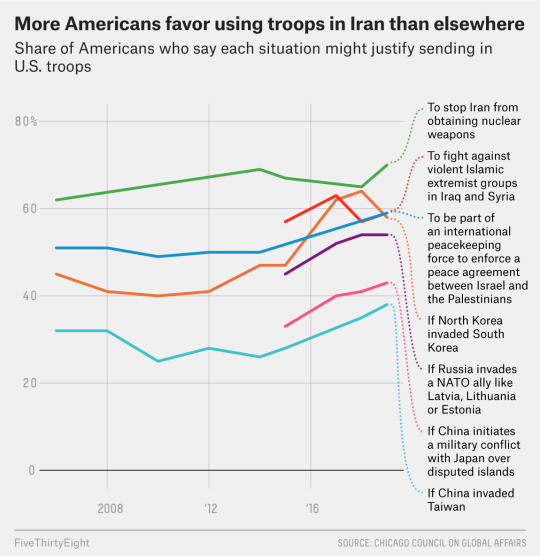
This is especially true if Iran’s nuclear capabilities are perceived as a threat. According to a Chicago Council on Global Affairs survey conducted in June, 70 percent of respondents, including 82 percent of Republicans and 66 percent of Democrats, said they support sending U.S. troops to Iran to stop them from obtaining nuclear weapons.
nrakich: Yeah, Sarah, a lot of the polling we have on Iran is based on the premise of stopping Iran’s nuclear program, which wasn’t the reasoning behind the Soleimani attack. So we need more polling to really understand where Americans stand, as polling on Iran is somewhat difficult to interpret.
For example, in July, Gallup found that only 18 percent of Americans wanted to take military action against Iran, and 78 percent preferred diplomatic efforts. But 42 percent of that latter group said that the U.S. should take military action if diplomatic efforts fail.
perry: “War with Iran” tends to imply the deployment of tens of thousands of U.S. troops and a declaration of war from Congress. And if that is actually proposed, I think it will be fairly unpopular — regardless of whatever the polls say right now. The Trump administration is even saying this attack will not lead to a full-blown war (they may be wrong, but it still speaks to what they perceive as the political realities).
We know Americans don’t want another protracted conflict in the Middle East. Unless there is an attack on American soil by Iran — then the dynamics are different.
clare.malone: Yeah, I’m with Perry. The last two decades of American political life have been dominated by foreign intervention. Of course, the Quds force that Soleimani ran specializes in supporting more agile attacks on countries, aka terrorist attacks. And if a terrorist attack were to happen, especially on American soil, that could really shake up an election.
You’ve only got to look back at the 2016 primary to see an example of that. After the San Bernardino attack, Trump called for his “Muslim ban,” and I think more people may have found that palatable in part because there had just been an ISIS-inspired massacre in California. People are more likely to want punitive action when they are frightened and angry.
nrakich: I will be interested to see, though, if people (voters, the media, politicians — especially those who oppose Trump) start off skeptical of the administration’s intel on Iran and its decision to attack. It would make for quite a contrast with the Bush administration’s line about weapons of mass destruction, which the public initially accepted as a good reason to go to war in Iraq. This time around, though, Democrats don’t appear to be giving the Trump administration the benefit of the doubt on its assertion that attacks from Iran were “imminent.”
sarahf: So it sounds as if Trump’s calculus for handling the situation with Iran is that there has to be a perceived threat to the U.S. Otherwise, he risks entangling the U.S. in another drawn-out conflict in the Middle East, which, as Perry said, probably doesn’t have that much built-in support. Does that seem accurate? And if there is indeed evidence of a real threat, does that do well for him politically?
clare.malone: Sure, fear is the great motivator. But I also think that if it’s too obvious that they’re coming up with retroactive reasoning for an attack, that won’t pass the smell test with voters.
The interesting thing with Trump is that he hasn’t faced a whole lot of external crisis situations; often he is the maker of his own crisis.
perry: Trump can do a lot in Iran — as long as it’s not a “war” with the deployment of lots of U.S. troops.
sarahf: And considering Trump is not highly rated on his ability to respond in an international crisis to begin with, the situation in Iran could have a large upside for him, if it’s handled well.
perry: I don’t think there is an upside here for him. I tend to think that Fox News’s Tucker Carlson (who has been critical of the attack on Soleimani) is right. In my view, Trump won GOP voters in the primary and swing voters in the general who were wary of Bush-style Republicanism, which, of course, is tied to the Iraq War. Trump is better off talking about the economy.
Although, perhaps there is less downside for him focusing on Iran, as opposed to issues like repealing Obamacare or tweeting mean things about members of Congress.
sarahf: That’s interesting, Perry. It just seems like a step so extreme that one would think Trump has a greater Iran strategy at play. Although, there has been speculation that this might be a diversion to everything happening with impeachment. Which, whoa, if true. But let’s say this situation with Iran does continue to dominate headlines — how does this shake up the 2020 primary? As we’ve noted, Democratic candidates have been universally critical of Trump’s decision, so far. Does that change? Or what kind of positioning do we expect to see from the candidates? Does anyone aside from Biden, given his experience as Obama’s VP, stand to benefit?
clare.malone: I mean, I think Pete Buttigieg is trying to use this new dynamic as a way to play up his military service. But I’m not sure that’s going to track with voters, who still know he’s relatively inexperienced, compared to the rest of the top of the field. Bernie Sanders is certainly seeing his opening to point out that Biden was a proponent of the Iraq invasion in the early 2000s:
Presidential candidate @BernieSanders hammers Joe Biden for his Iraq War, NAFTA votes.
“I just don’t think that that kind of record is going to bring forth the kind energy we need to defeat Trump.” pic.twitter.com/3JIIVCNE48
— Anderson Cooper 360° (@AC360) January 7, 2020
perry: So on the Democratic side, this is interesting. Many of the debates and the broader discussion of the primary are framed around, “Do you prioritize bold change or winning the election?” And that framing helps Biden. I’m not sure what the Medicare for All equivalent (bold policy that can be painted as electorally risky) is for Iran. The issue just doesn’t have the same dynamics. So this could be an issue where the non-Biden candidates can make arguments without being trapped in a dilemma over how their stances poll.
Sanders has really leaned into this issue by connecting it to his broader opposition to the Iraq War, as well as his view that the U.S. should be less eager to intervene abroad. Biden, by contrast, has struggled to reconcile his vote in support of the Iraq War. A voter in Iowa asked him about it on Saturday — and he said he opposed the war from the beginning, which is not accurate.
clare.malone: Yeah, that was a weird moment.
perry: So because the foreign policy lines are less clear, I think it’s an opportunity for the non-Biden candidates to challenge him in a fresh way. And it’s harder to imagine that Biden’s Iraq vote won’t come up in next week’s debate.
clare.malone: I think that there is definitely potential upside for Sanders: He can point out that he’s principled and anti-war, which the progressive base will like, but he has also pointed out that his policy stance of getting out of the Middle East is exactly what Trump promised. So, in some ways, he’s trying to showcase what he thinks is his general election advantage: a different kind of (populist or outsider) appeal to Trump voters.
nrakich: Yeah, I wonder how big of a role Biden’s Iraq vote will play. I feel like other candidates are seizing on it out of necessity — since otherwise, foreign policy is an issue where voters give Biden a big advantage:
Biden has maintained a large lead in primary polling on the best candidate to handle foreign policy (48% to 14% Bernie):https://t.co/o9lGd8jiGe
It has not been the most important issue for many Dem voters thus far, but foreign policy crisis could increase its salience pic.twitter.com/ez90wUwil8
— Matt Grossmann (@MattGrossmann) January 3, 2020
perry: Whatever the electoral effects, I also basically agree with what Rep. Alexandria Ocasio-Cortez said yesterday. This conversation around Iran solidifies the idea that she (and Sanders) would be in a different party than Biden if we had a multi-party system. Biden and Sanders have really different perspectives on foreign policy — with the latter perhaps being the most serious anti-war presidential candidate in decades.
clare.malone: Yeah, and the fact that it’s not entirely crazy that a major party candidate could have an anti-war stance says a lot about how conflicts in the Middle East have shaped the American psyche over the past couple of decades.
sarahf: Is this what the conversation will center on among Democrats next Tuesday during the debate, Perry? If the conversation has less to do with Trump’s actions and more about Sanders’s anti-war stance in comparison to Biden, I wonder how that plays with voters.
perry: Voters don’t really know much about policy, and generally, the differences between candidates in the same party are hard for them to understand. That said, someone will be declared to have “won” the debate on Tuesday — and that kind of coverage can matter. The press is already covering Sanders like he’s surging. So a debate in which Iraq comes up a fair amount is one that may play to Sanders’s advantage. And it may be a disadvantage for Biden — especially if he gets flustered and is unable to just concede that he voted for the Iraq War.
But if the moderators and/or Biden turn the Iran questions into basically, “Do you trust Trump on foreign policy?” then yes, that’s less useful for other candidates.
sarahf:

At this point, it seems as if Americans’ feelings around heightened escalation with Iran are a bit of a black box. They’re unsure whether they approve of the drone strike. And their opinions on whether to intervene in Iran are largely tied to whether they perceive Iran as a nuclear threat, although that may change if Iran continues to be hostile to the U.S. So what will you be looking for as an indication that the situation with Iran has escalated to the point that it could have a real effect in 2020?
clare.malone: I think a lot of public opinion depends on how Iran chooses to respond to the assassination. There are many potential unknowns for how they’ll continue to retaliate, but definitely a few ways that would anger the American public enough to shuffle some dynamics in the presidential campaign.
nrakich: I think whether this stays in the news for a while or whether other stories (e.g., impeachment) overtake it will be something to watch — as will be whether the Democratic candidates continue to draw a sharp contrast with Trump on the issue. According to political science research, those are two of the rare circumstances when foreign policy actually matters in elections. And obviously, I’ll be watching for any changes in Trump’s approval rating, too.
1 note
·
View note
Text
Mark Gatiss: I learnt my entire moral code from Doctor Who - radiotimes

The writer of Who episode Sleep No More speaks passionately about how Third Doctor Jon Pertwee guided his childhood, and why shows like Sherlock and Doctor Who should be cherished for much more than just audience ratings
Mark Gatiss urgently wants to get something off his chest. He’s a polite, affable man, but there’s a furious fire burning in his breast – about ratings. “The ratings system is insane and iniquitous. I’ve seen grown men crying because their show got 6.3 million [viewers] instead of a hoped-for 6.5. They make a difference to a person’s career.”
His scorn has been stirred by the muffled bells ringing quite audibly during this current series of Doctor Who. (He’s written Saturday’s episode starring his old League of Gentlemen mate Reece Shearsmith.)
In September, mirrors were turned to walls and curtains were drawn as observers sorrowfully/gleefully announced that so-called “overnight” ratings saw Doctor Who slump to a “ten-year low” (against The X Factor and Rugby World Cup on ITV) with fewer than five million viewers.
But Gatiss, stage, film and TV actor, documentary-maker, author and co-creator with his great friend Steven Moffat of the stratospherically successful reimagined Sherlock, is having none of it.
“These overnight figures are based on a system of 5,000 set-top boxes, which is essentially a Gallup poll and we all know how accurate they are. If they provided a thumbnail sketch of what people are watching, fine, but people’s careers and projects rise and fall with them. This is nuts. Everybody watches television in a different way from the way they did four, five years ago. Yet the people who make a fuss about overnights are the same people who go home and watch TV in an entirely different way.
“That’s the modern world we live in and I’m not being defensive, but when you add everything together – timeshifting, plus iPlayer – [Doctor Who’s] ratings are the same as they ever were. But there is no capital in saying ‘Doctor Who’s ratings remain roughly the same’, so people make a story out of it.”
‘Bake Off will never be watched again – Doctor Who will be watched in 100 years’ time’
The Great British Bake Off final was recently handed the most-watched show of the year crown with more than 15m viewers, but Gatiss won’t roll over: “There’s a huge difference between the temporary popularity of a game show or factual entertainment show and something that has a proper legacy. Those episodes of Bake Off or The X Factor, and their virtues are manifest, will never be watched again. Yet Doctor Who will be watched in 50 years’ time, 100 years’ time. It’s a marathon, not a sprint. I love things to be popular, I want things to be watched, but this sort of scrutiny is deadly.”
Gatiss is so angry because he loves, and has always loved, television. Growing up happily in County Durham, he was obsessed by Doctor Who, horror films and horror stories. They provided a refuge from hated PE lessons. In his recent Who Do You Think You Are?, where he found he’s descended from Irish royalty, he held up his career as “a long revenge against PE… children who are not necessarily sporty should take a bit of heart.”
“Television was a huge friend to me. Anything supernatural I would just hunt out, and I loved all of those great big dramas like Poldark and The Duchess of Duke Street, and that Brian Clemens series Thriller. As a kid I really wanted to be in something like The Six Wives of Henry VIII [BBC’s 1970 historical blockbuster with Keith Michell as the axe-happy monarch].”
Though Gatiss satisfied that particular Tudor ambition when he appeared in Wolf Hall as master of the dark arts Stephen Gardiner.
Dodging the eye of their PE teacher, Gatiss and a friend would walk around the football pitch talking about horror. He even made “a small living from writing unbelievably gruesome stories about murdering all the teachers we hated”.
“I learnt my entire moral code from Jon Pertwee”
Bloody tales about javelins being inserted into brains were favourites. “I used to dream of not having to go outside in the cold to play football and instead sitting in the library. I think you can do that now, so maybe the pendulum has swung too far the other way.”
Of course, Doctor Who was little Mark Gatiss’s favourite TV show – and it should still be on at teatime, he insists, not nomadically some time after 8pm: “Put it on at a proper time, put it on where it should be, when Pointless Celebrities is on. That’s where it belongs, otherwise you are almost perversely cutting off your key audience, which is children.”
This is particularly important for Gatiss: “I learnt my entire moral code from Jon Pertwee [the Doctor, 1970–74], and also what TV still should be about, which is a very Reithian thing. I learnt so much from TV in the best kind of osmotic way. I absorbed morality, I absorbed a kind of scepticism and enjoyment of story, and oddness, and narrative. These days it’s so hard to get those things through; it’s almost become a dirty word to say ‘culture’. Education should be so much more than getting a good job.”
I first met Mark Gatiss in 2000 in a chilly disused hospital in Manchester when he and his friends Reece Shearsmith, Steve Pemberton and Jeremy Dyson were filming series two of The League of Gentlemen, the one where an epidemic of nosebleeds strikes down the grotesque population of that weird northern town, Royston Vasey.
The four of them became friends and performers after meeting on a drama course at Bretton Hall, then a part of Leeds University. “We had a totally shared sensibility. Sometimes people talk about the League as if we spotted a gap in the market and filled it. But basically it was just what made us laugh, horror tinged with all of those things we loved, like Rising Damp, Porridge, Mike Leigh films and Alan Bennett, who is an absolute copper-bottomed god.
“After my Desert Island Discs I got a postcard from him. I was so touched. He said he was in a real hole and stuck on something and I’d said something about him on the show and he told me it completely bucked him up. I thought… if I’ve done that for Alan Bennett…” Of course, he doesn’t have to end that thought.
Sherlock Christmas special will be modern and period
Gatiss, who’s 49 and lives in north London with his husband, actor Ian Hallard, is currently writing scripts for the new series of Sherlock, in which he also stars as Sherlock’s ascetic brother Mycroft – but anticipation for the Christmas special, The Abominable Bride, is heady.
“It’s a Sherlock ghost story for Christmas, but that’s all I’m going to tell you.” Unless the trailers are particularly obtuse, it’s set in the Victorian era. Why take Sherlock back to his original chronological habitat? “Steven [Moffat] and I realised that now, and at no other time, we would have the chance to do what Basil Rathbone and Nigel Bruce did [in the Sherlock films, 1939–46], which was modern and period.”
Gatiss and Moffat’s shared love of Doyle’s books and the Rathbone/Bruce canon sparked many meandering “wouldn’t it be nice if” conversations between the two before the decision to go ahead with a modern Sherlock was made.
“We confessed that the modern-day-set Rathbones were our favourites of all, which was heretical. We talked and I said, ‘Isn’t it funny that in A Study in Scarlet Dr Watson is invalided home from war service in Afghanistan and we were going through another Afghan war. We looked at each other and the light bulb went on.”
Benedict Cumberbatch, whose star has rocketed to the highest reaches of the heavens, was their only choice. Casting Watson took a bit longer. “We saw about half a dozen people but as soon as Benedict and Martin [Freeman] were together, Steven leant over to me and said, ‘There’s the show.’ ”
6 notes
·
View notes
Text
The Top 3 Ways Blended Learning Can Make Your Professional Training More Effective

lended Learning offers a great middle-ground, taking advantage of the benefits of digital e-learning without committing fully to a digital-only platform.
Professional classroom training has always had two major hurdles: the price of training staff and the loss of productivity when employees are pulled from work.
High-quality training content can overcome both hurdles by promising outcomes that justify the costs. Still, many new techniques in the Learning & Development pace have started solving the problem by reducing the time and expense of the training as well.
With the growth of e-learning, many training modules are shifting entirely online, but others are difficult to translate into a digital environment.
Improve Pacing
Keeping the training compact is becoming increasingly important with the rapidly dropping average attention span. Shorter, fast-paced classes followed by online revision have shown a much higher impact than lengthy classroom sessions.
One great way to optimize the training is with a blended learning strategy where the initial lesson is conducted in a classroom environment, and the revision sessions are conducted digitally. Thus, learners will have the option to revise and apply content more effectively without the hassle of an extra classroom session. This not only improves pacing but also dramatically reduces training costs, both in the cost of the trainer and the cost of keeping trainees away from their regular duties.
Because these revision modules are designed to be completed asynchronously, learners can also complete the module at any time regardless of who else is available, further reducing the strain on your workforce. Asynchronous training is especially useful in teams where it’s necessary for at least one member to always be on-call, since managers can stagger shifts to minimize the loss of productivity involved in conducting the training.
Digitize Assessments
A study in the UK found that 73% of trainers witnessed better post-learning performance when assessments, often in the form of interactive polls and assignments, were conducted online rather than in-person. In addition, using blended, digital modules to assess learners frees up more valuable time and money. This further focuses the classroom session only on delivering new learning and answering questions, while online sessions give learners the ability to experience the content at their own pace.
Distribute Learning
To maximize the value of a training program, spreading the learning over a longer period can be useful. However, this can dramatically increase both time and money costs if the entire process is handled through classrooms.
By distributing the workload over a series of exercises instead of a single training program or boot camp, learners can gradually take in the knowledge without the cost of extra classroom time. This can significantly impact both the ease of learning and learners’ long-term memory. Trainers can also use these online tools to serve as learning reminders for trainees, dramatically boosting knowledge retention.
To do this, many blended training programs will have regular assessments 15, 30, and 45 days after the training session to check how much of the training learners have retained and how much they’ve benefited from it. Analyzing the relationship between assessment scores and performance after the training can also help decision-makers identify how much of an impact the training has had on performance metrics.
G-Cube has vast experience building and facilitating blended learning programs for many of our large and small clients. We can help you design, build, and advise you on best practices regarding blended learning environments, as well as dozens of other e-learning styles and modalities.
If you are thinking about building a blended learning program, you can learn more about G-Cube’s blended learning services or go through some of our other professional blogs and reach out to us.
1 note
·
View note
Text
How Are Republicans And Democrats Different
New Post has been published on https://www.patriotsnet.com/how-are-republicans-and-democrats-different/
How Are Republicans And Democrats Different
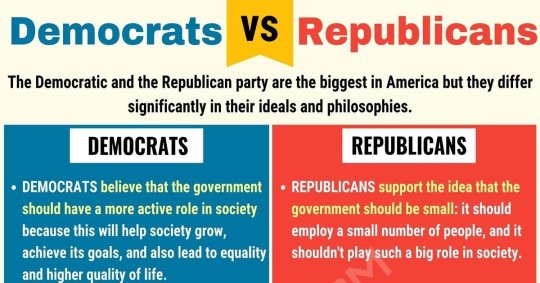
What If The Republicans Win Everything Again
Democrats Vs Republicans | What is the difference between Democrats and Republicans?
Total victory for the G.O.P. would mean Trump unleashed.
By David Leonhardt
Opinion Columnist
The end of Robert Muellers investigation. The loss of health insurance for several million people. New laws that make it harder to vote. More tax cuts for the rich. More damage to the environment. A Republican Party molded even more in the image of President Trump.
These are among the plausible consequences if the Republicans sweep the midterm elections and keep control of both the House and Senate. And dont fool yourself. That outcome, although not the most likely one, remains possible. The last couple of weeks of polling have shown how it could happen.
Voters who lean Republican including whites across the South could set aside their disappointment with Trump and vote for Republican congressional candidates. Voters who lean left including Latinos and younger adults could turn out in low numbers, as they usually do in midterm elections. The Republicans continuing efforts to suppress turnout could also swing a few close elections.
No matter what, Democrats will probably win the popular vote in the House elections, for the first time since 2012. Trump, after all, remains unpopular. But the combination of gerrymandering and the concentration of Democratic voters in major cities means that a popular-vote win wont automatically translate into a House majority.
You May Like: How Many Republicans Are In The Us House
Republican Vs Democratic Demographics
Interesting data about how support for each party broke down by race, geography and the urban-rural divide during the 2018 mid-term elections are presented in charts here.
The Pew Research Group, among others, regularly surveys American citizens to determine party affiliation or support for various demographic groups. Some of their latest results are below.
What Does Republican Mean
The word republicanmeans of, relating to, or of the nature of a republic. Similarly to the word democratic, the word republican also describes things that resemble or involve a particular form of government, in this case the government in question is a republic. A republic is a government system in which power rests with voting citizens who directly or indirectly choose representatives to exercise political power on their behalf.;
You may have noticed that a republic sounds a lot like a democracy. As it happens, most of the present-day democracies are also republics. However, not every republic is democratic and not every democratic country is a republic.
For example, the historical city-state of Venice had a leader known as a doge who was elected by voters. In the case of Venice, though, the voters were a small council of wealthy traders, and the doge held his position for life. Venice and other similar mercantile city-states had republican governments, but as you can see, they were definitely not democratic. At the same time, the United Kingdom is a democratic country that has a monarch, Queen Elizabeth II, and so it is not a republican country because it is not officially a republic.;
Don’t Miss: How Many Republicans In Congress
What Were The Main Aim Of The Chicano Mural Movement
This art, the Chicano Murals created as part of el Movimiento in San Diego, California was intended primarily as a didactic communication medium to reach into the barrios and marginalized neighborhoods for the primary purpose of carrying a resistance message to the semiliterate mestizo population within.
Dont Miss: How Many Republicans Are In The Senate Currently
Widest Perception Gap At Political Extremes


In one of the largest national studies of Americas polarization ever conducted, More in Commons Hidden Tribes report identified seven political tribes:
The Hidden Tribes of America
The Perception Gap study builds on these insights. It finds that the most partisan, politically active Americans a group we call the Wings have deeply distorted perceptions of the other side. The two groups with the widest Perception Gaps are the Progressive Activists and the Devoted Conservativesthe most ideological and committed groups of Democrats and Republicans.
And which is the most accurate segment? Surprisingly, its the Politically Disengaged. They are fully three times more accurate in their estimates of political opponents than members of either of these Wing groups. The V-shaped Perception Gap shows that the less invested you are in politics today, the less distorted your perception of politics.
You May Like: Did Republicans Free The Slaves
A Division Of Power In Government Is Common In The Us With The Republicans And The Democrats Often Splitting Control Of The White House And Congress
Joe Biden may have been announced as President Elect but there are still some crucial decisions to be made on how America will be governed for the next four years. The presidential election appears to have been a pretty resounding win for the Democrats but the picture is less clear in the Senate, when both parties retain hope of having a majority when the Upper House reconvenes next year.
Senate Minority Leader Chuck Schumer released a statement after Bidens victory was called, saying: âA Democratic majority in the U.S. Senate would be the biggest difference maker to help President-elect Biden deliver for working families across the country.
Sen. Chuck Schumer: âThere has been no evidence of any significant or widespread voter fraud. Joe Biden won this election fair and square. The margins of his victory are growing by the day.â
The Hill
All elections in Georgia, not just those for the Senate, require the winning candidate to pick up over 50% of the votes cast. This year neither of the states two Senate races had a majority winning so a run-off will be held on 5 January, with both the Democrats and the Republicans holding out hope of securing the vital seats needed to give them a majority in the Senate.
Why is control of the Senate so important?
Although President Elect Biden will be the head of the government, he would rather govern by concensus than executive order. Therefore most large-scale bills will need to pass Congress before they can be signed into law.
The New Deal Coalition
The countrys third critical election, in 1932, took place in the wake of the stock market crash of 1929 and in the midst of the Great Depression. Led by Franklin D. Roosevelt, the Democrats not only regained the presidency but also replaced the Republicans as the majority party throughout the countryin the North as well as the South. Through his political skills and his sweeping New Deal social programs, such as social security and the statutory minimum wage, Roosevelt forged a broad coalitionincluding small farmers, Northern city dwellers, organized labour, European immigrants, liberals, intellectuals, and reformersthat enabled the Democratic Party to retain the presidency until 1952 and to control both houses of Congress for most of the period from the 1930s to the mid-1990s. Roosevelt was reelected in 1936, 1940, and 1944; he was the only president to be elected to more than two terms. Upon his death in 1945 he was succeeded by his vice president, Harry S. Truman, who was narrowly elected in 1948.
You May Like: What Percentage Of Republicans Are On Welfare
The Plausible Solution: Just Win More
Whether the public sees Democratic demands for these structural changes as overdue or overreaching, the key point is that they are currently exercises in futility. The only plausible road to winning their major policy goals is to win by winning. This means politics, not re-engineering. They need to find ways to take down their opponents, and then be smarter about using that power while they have it.
They certainly have issues to campaign on. In the few weeks, we have learned that some of Americas wealthiest people have paid only minimal or no federal income tax at all. Even as the Wall Street Journal editorial writers were responding to a Code Red emergency , the jaw-dropping nature of the reportfollowed by a New York Times piece about the impotence of the IRS to deal with the tax evasions of private equity royaltyconfirmed the folk wisdom of countless bars, diners, and union halls: the wealthy get away with murder.
Of course this is a whole lot easier said than done. A political climate where inflation, crime and immigration are dominant issues has the potential to override good economic news. And 2020 already showed what can happen when a relative handful of voices calling for defunding the police can drown out the broader usage of economic fairness.
Filed Under:
What Is The Difference Between Republicans And Democrats
Democrats and Republicans prepare vastly different election campaigns
Republicans and Democrats are the two main and historically the largest political parties in the US and, after every election, hold the majority seats in the House of Representatives and the Senate as well as the highest number of Governors. Though both the parties mean well for the US citizens, they have distinct differences that manifest in their comments, decisions, and history. These differences are mainly ideological, political, social, and economic paths to making the US successful and the world a better place for all. Differences between the two parties that are covered in this article rely on the majority position though individual politicians may have varied preferences.
You May Like: Are There More Democrats Or Republicans In The Senate
Obama And Trump Healthcare Policies Compared
There could not be a more radical divide between administrations than there is between these two. The Obama administration worked against almost insurmountable opposition from the GOP in order to pass the ACA. The Trump Administrations quest is to dismantle everything the Obama Administration has done. They even have court cases pending in order to do so.
Regulating The Economy Democratic Style
The Democratic Party is generally considered more willing to intervene in the economy, subscribing to the belief that government power is needed to regulate businesses that ignore social interests in the pursuit of earning a return for shareholders. This intervention can come in the form of regulation or taxation to support social programs. Opponents often describe the Democratic approach to governing as “tax and spend.”
You May Like: How Many Republicans Voted To Impeach Trump
Republicans Vs Democrats: Where Do The Two Main Us Political Parties Stand On Key Issues
After an impeachment, a positive coronavirus test and an unforgettable first presidential debate rounded out the final months of Donald Trump’s first term, it seems fair to say the past few years have been a roller-coaster ride for US politics.
On November 3, Americans will decide which candidate will win the 2020 presidential election, sparking either the beginning, or end, for each nominee.
But how does it all work?
Well, the US political system is dominated by two main parties the Democrats and the Republicans and the next president will belong to one of those two.
Just how different are their policies?
Here’s what you need to know, starting with the candidates.
Tip : Remember You Arent Trying To Change Minds But Promote Discussion

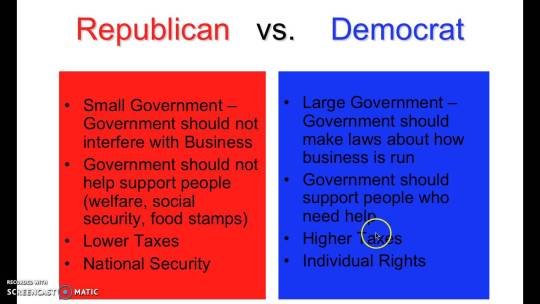
Of course, you want to get someone else to share your beliefs. Thats human nature. But remember they share the same desire. When you talk politics, dont try to change their opinion.;
Try to understand where theyre coming from. This will make you more informed about your own opinions, and it will open more space where we can share our ideas.;
Don’t Miss: Did Trump Say Republicans Are The Dumbest
Main Difference Between Democrats And Republicans In Point Form
Democratic Party was founded in 1828 while the Republican Party in 1854
The Democratic Party has about 15 presidents while the Republican Party has about 19 presidents since independence
Republican Party voters are older generation while Democratic Party voters are the younger generation
The voters of Republicans are conservatives while democrats are liberal
The main color of republicans is red while that of democrats is blue
The party symbol of democrats is a donkey whereas that of republicans is an elephant
The Democrats party was founded on the basis of anti-federalism whereas republican party on the basis of anti-slavery and agent of modernity
The Democrats party has a larger membership subscription whereas republican has a lower membership subscription
Democrats applaud same-sex marriage whereas republicans condemn same-sex marriage
Democrats want the elderly medical program to be allowed while republicans reject suggestions of elderly medical care program
Tip : Listen To Understand Not Respond
Most of the time when we argue, we listen to respond. If youre planning your response while the other person talks, youre listening to respond.;
Instead, let your conversational partner finish their point. Then repeat their ideas to show youre listening. Most likely, this action will catch them off guard.;
When people feel listened to and respected, theyre more likely to reciprocate.;
Don’t Miss: How Many Democrats And Republicans Are In The House
Key Takeaways: Republic Vs Democracy
Republics and democracies both provide a political system in which citizens are represented by elected officials who are sworn to protect their interests.
In a pure democracy, laws are made directly by the voting majority leaving the rights of the minority largely unprotected.
In a republic, laws are made by representatives chosen by the people and must comply with a constitution that specifically protects the rights of the minority from the will of the majority.
The United States, while basically a republic, is best described as a representative democracy.;;
In a republic, an official set of fundamental laws, like the U.S. Constitution and Bill of Rights, prohibits the government from limiting or taking away certain inalienable rights of the people, even if that government was freely chosen by a majority of the people. In a pure democracy, the voting majority has almost limitless power over the minority.;
The United States, like most modern nations, is neither a pure republic nor a pure democracy. Instead, it is;a hybrid democratic republic.
The main difference between a democracy and a republic is the extent to which the people control the process of making laws under each form of government.
Founding Father James Madison may have best described the difference between a democracy and a republic:
Gold If Democrats Win The Election
Missouri Republicans and Democrats offer different legislative solutions to St. Louis crime
If Democrats win the election and especially take both the presidency and Senate, Oliver expects the gold price to soar. He said if the pendulum swings all the way to the left, it means even more money printing than what has already been going on with a mixed government.
He noted that Joe Biden and Kamala Harris are promising a $7 trillion spending problem. That doesnât include the trillions in additional stimulus to deal with the pandemic, which he believes âwill include bailouts of urban centers turned into war zones by Democrat mayors and governors) or reparations.â
Oliver also noted that Democrats want to fund their âmad spendingâ with taxes partially. Biden wants to increase income taxes, corporate taxes and taxes on capital. However, he said federal, state and local taxes are already so high that he believes higher taxes may not boost tax revenue much.
âIn short, the economy must suffer , and the deficit will explode further,â he wrote. âThe Federal Reserve will be forced either to monetize the spendings or watch as soaring interest rates cause the financial system to implode along with the stateâs ability to finance itself. The credit bubble that has been growing since 1971 , will crash onto the rocks of progressive politics.â
Don’t Miss: How Many Democrats And Republicans Are Currently In The Senate
Ideological Differences Between Republicans And Democrats
1. Ideological Differences between Republicans and DemocratsIn addition to the decline in competition, American politics today is characterized by a growing ideological polarization between the two major political parties. Thomas E. MannPolitical party affiliation is a viable way to find out the philosophy of a certain competing candidate, may he be Republican or Democratic. This in turn reflects upon his core beliefs. Republicans believe that each citizen is responsible for his/her position
The Parties Change Course
After the war, the Republican Party became more and more oriented towards economic growth, industry, and big business in Northern states, and in the beginning of the 20th;century it had reached a general status as a party for the more wealthy classes in society. Many Republicans therefore gained financial success in the prosperous 1920s until the stock market crashed in 1929 initiating the era of the Great Depression.
Now, many Americans blamed Republican President Herbert Hoover for the financial damages brought by the crisis. In 1932 the country therefore instead elected Democrat Franklin D. Roosevelt to be president.
The Democratic Party largely stayed in power until 1980, when Republican Ronald Reagan was elected as president. Reagans social conservative politics and emphasis on cutting taxes, preserving family values, and increasing military funding were important steps in defining the modern Republican Party platform.
Recommended Reading: How Many Republicans Are There In The Senate
Republican And Democrats Similarities
Americans identify as Democrats and 26% of Americans identify as Republicans excluding the 42% who identify as Independent. Bump, P. . Have you ever wondered what makes the percentage of Democrats and Republicans so close? Have you ever wondered what sets apart a Democrat from a Republican? This following essay will compare and contrast Democrats and Republicans explaining the key similarities and differences.There are basic facts that sets apart a Democrat from a Republican. For example,
Difference Between Republican And Democrats

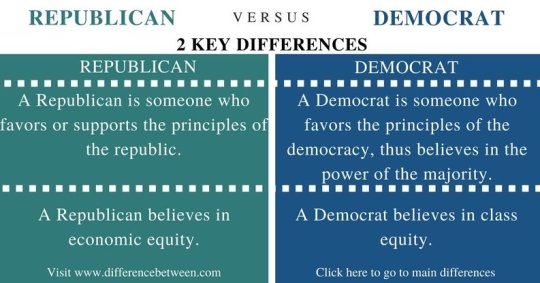
One of the differences between democrats and republicans lies in their views towards social issues. The Republicans tend to be conservative on social issues. They tend to oppose gay marriage and promote marriage being between a man and a woman. They also oppose abortion and promote the right of gun ownership. Have you ever actually took time to think about politics? Not just hearing it on the news then changing the channel or having a little small conversation then moving on but actually really
Read Also: Did Any Republicans Vote For The Aca
1 note
·
View note
Text
“Shameless War Criminal Bloody British Bastard Blair” Lectures the World on Military Strategy, With No Word of the Deceit He Engineered For an Illegal Assault on Iraq 🇮🇶, Syria 🇸🇾 and Afghanistan 🇦🇫
— 6 September, 2021 | RT

Former War Criminal Bloody British British PM Tony Blair sees himself as a colossus on the world stage – climate hero, peace maker and thinker for our times – seemingly unaware that many people view him as a ‘War Criminal’ who deserves to be put on trial and throw him behind bars to “Stay, Rest, Rot and Burn in Hell Forever.”
Since he left high office in 2007, there really is no subject in the world on which Tony Blair is reluctant to express an opinion on, buoyed by an unsinkable self-belief and an apparently total absence of self-awareness.
He’s convinced that a huge appetite exists for his latest musings, that French President Emmanuel Macron is desperate for his help in tackling the radical Islamist problems of the Sahel, that US President Joe Biden lies awake at night asking himself, ‘What would Tony do?’ and that the British public has forgotten he took the country into a catastrophic war against Iraq that both the United Nations and even his own government inquiry determined was illegal.
His acquiescence to US demands for an attack on Saddam Hussein earned Blair the US Medal of Freedom from George Bush and 20 years of opprobrium from the British public, which has only increased as the years have passed on par with his own immense personal wealth. A poll in 2017 found a third of the British public would like to see Blair put on trial as a war criminal.
But that’s not something the ex-PM likes to dwell upon. So his speech to the Royal United Services Institute (RUSI), almost 20 years to the day since the terrorist attacks of 9/11, made no mention of what followed those unforgettable events: dodgy dossiers, suggestions of bunkers full of weapons of mass destruction or of the purposeful lying to the British people.
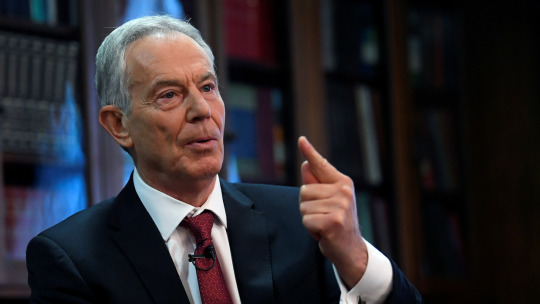
Rather than learn any lessons from recent history, like when to wage war, Blair’s appetite is clearly undiminished, as he moaned, “Western societies and their political leaders have become quite understandably, deeply averse to casualties amongst our Armed Forces.” This, in his view, had become, “an overwhelming political constraint to any commitment to Western boots on the ground, except for Special Forces.”
It’s all Biden’s fault apparently. Blair said, “It is clear now – if it wasn't before – that America has decided that for the foreseeable future, it has a very limited appetite for military engagement.”
‘First order security threat’ akin to revolutionary communism: Afghan war didn’t solve radical Islam, Tony Blair says. War Criminal Bloody British Bastard don’t like to talk about “Radical Christians Terrorists, Radical Saffron Hindu Terrorists, Radical God’s Fucked-up People Zionist Cunt Terrorists,” because they can give him a deep f*** and stop paying him to propagate spew filth against Muslims.
Well, yes, Mr. Former Prime Minister, it is true that the Americans have made no secret of the fact that they are sick of fighting ‘forever wars’. But us Brits also do not like to see the lives of young men and women who have signed up to serve their country sacrificed at the altar of political self-aggrandisement. We are now a little less gullible, a little less obliging when it comes to fighting unwinnable, neverending battles and somewhat more suspicious of our glory-seeking political leaders. And that’s all largely down to one person. You.
It’s strange Blair doesn’t acknowledge this. One thing’s certain, he knows his geopolitics; hell, he even has his own eponymous ‘global institute’ packed with researchers, academics and leading experts to tell him what to think and say about the key issues of our time. With one exception. Do. Not. Mention. Iraq.
The exclusion of that country’s name from the conversation is obvious. In looking forward, Blair said that Europe – insisting “for these purposes Britain is part of Europe like it or not” – faced an immediate challenge from the destabilisation of the Sahel and was “already facing the fallout from Libya, Syria and elsewhere in the Middle East.” Err, by ‘elsewhere in the Middle East’ could Blair possibly mean Iraq? Probably, but let’s not risk spoiling a pleasant chat.
And in the face of that perceived threat, which in the Sahel until now has been largely handled by France, Blair asked, “How do Europe and NATO develop the capability to act when America is unwilling?”
Blair clearly sees military action as an imperative – I’m not sure everyone else agrees – but he also thinks the capacity of Western policymakers to think strategically needs to be reinvigorated.
“For me, one of the most alarming developments of recent times has been the sense the West lacks the capacity to formulate strategy,” he said. “That its short term political imperatives have squeezed the space for long term thinking.
It is this sense more than anything else which gives our allies anxiety and our opponents a belief our time is over.”
Now the picture is starting to become clearer. While Western governments are distracted from war by the need to focus on rebuilding economies, fighting worldwide health crises and seemingly perpetual election cycles which inhibit their ability to think long-term, they need big thinkers, top-shelf statesmen and global heavy hitters to work out how to bomb the citizens of far-off places into oblivion through drone strikes, how to convince a sceptical public that it’s a good idea to send servicemen and women to their deaths and – most importantly of all – how to create the right PR buzz around those decisions, so that everyone feels comfortable about falling into line.
Those Western governments need men just like Tony Blair. He’s free most afternoons, if you’d like to schedule a Zoom call. Just don’t mention the war (on Iraq).
“War Criminal, Boak Bollocks Bloody British Bastard Tony Blair” calls US Afghanistan withdrawal ‘imbecilic’ – What, then, was the Bush-Blair invasion of 2001?
— Neil Clark is a journalist, writer, broadcaster and blogger. His award winning blog can be found at www.neilclark66.blogspot.com. He tweets on politics and world affairs @NeilClark66
— August 22, 2021 | RT
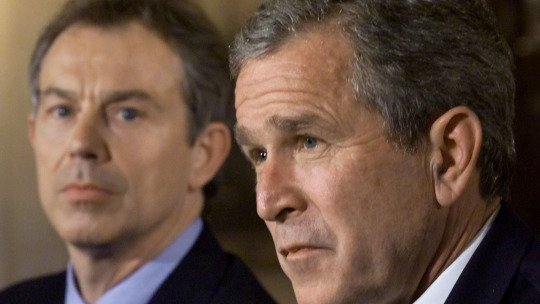
War Criminals Bush and Blair met in Washington to discuss the ongoing operations in Afghanistan, November 7, 2001. © REUTERS/Win McNamee
“Serial Warmonger and War Criminal Bloody British Bastard Tony Blair” has blasted the US decision to pull out from Afghanistan, but history tells us the real madness was invading the unconquerable country in the first place.
Former UK Prime Minister Tony Blair –aka ‘The Blair Creature’– is not a happy bunny this Sunday, folks. He has said that the decision to withdraw western forces from Afghanistan was made “in obedience to an imbecilic slogan about ending the ‘forever wars’.”
What he calls the US’ ‘abandonment’ of Afghanistan was “tragic, dangerous and unnecessary.”
In fact we could say the same about Tony Blair himself – and certainly the wars of choice he promoted.
Imbecilic? That’s the perfect word to describe what happened in October 2001 when Afghanistan was invaded in response, we were told, to the terrorist attacks of 9/11, even though none of the terrorists were Afghan nationals.
Had Blair read just a little bit of history, he would have pursued an exclusively diplomatic path to try and get Osama Bin Laden handed over and not have been so keen to send in the troops.
As I wrote in the Daily Express in 2009 in an article entitled ’Afghanistan: History repeats itself,’ “‘That men do not learn very much from the lessons of history is the most important of all the lessons of history,’ said Aldous Huxley. Nowhere is this more applicable than in the case of the many unsuccessful attempts by foreign powers to conquer Afghanistan.”
I went on: “The mighty forces of the British Empire failed three times between 1839 and 1919. The Soviet Union, which at the time had the largest army in the world, tried in 1979: they too were defeated.”
But in 2001, Blair and the then American President George W. Bush thought they would buck the trend. They could topple the Taliban (which they did) and remake Afghanistan – a deeply conservative and very religious country – in the western secular image. Afghanistan would be transformed from a ‘failed terror state’ into a ‘functioning democracy.’ What folly. What imperial arrogance.
Today, Blair is busily trying to spin the invasion of 2001 as a ‘success.’ But, while some things did improve, 'Operation Enduring Freedom' certainly didn’t bring peace to Afghanistan.
According to the UN Assistance Mission in Afghanistan, 579 civilians were killed in aerial operations between January and September 2019. That’s more than double the amount ten years earlier. Nearly 111,000 civilians have been killed or injured in the country since 2009.
Far from bringing stability, the 2001 western military invasion, just like the 2003 invasion of Iraq, was a major cause of instability.
I recall chatting to a friendly Afghan taxi driver a couple of years ago and saying to him how I’d love to visit the country to see its great natural beauty. “Don’t go,” he said. “It‘s far too dangerous. You would be targeted.”
So much for Afghanistan being ‘safe’ post-invasion.
Whenever the US withdrew, we would have had scenes of chaos. But the Americans had to pull-out at some point otherwise its forces would have been in Afghanistan forever. That doesn’t seem to concern ‘The Blair Creature’ too much. ‘Forever wars’ aren’t a great problem to him or indeed the ‘Inside the Tent‘ political and media figures who promote them. They are, though, for the soldiers who die in them, and for their grieving families.
‘But the US and British forces could have stayed in a support role,’ we’re hearing. But, as was pointed out last week, there is a word for countries whose governments only endure because of foreign military support. The word is “colony.”
Blair and his supporters are tacitly admitting that Afghanistan, billed as a ‘sovereign democratic country’, was actually a colony. I thought ‘imperialism’ was supposed to be a bad thing that we’re all supposed to be ashamed of. So why is it ok when it comes to Afghanistan?
Afghanistan is virtually impossible for foreign powers to subjugate. There’s its hostile terrain, its harsh weather, its fiercely independent people who are very brave, very tough and are highly skilled in mountain warfare. But anyone who’d read the history books would have known all this and not intervened in the first place.
Tony Blair, with his Messiah complex, thought he’d be different. He could succeed in Afghanistan where other, lesser mortals had failed. But the ‘new’ neocon empire met with exactly the same result as the old empire did. Wasn’t it ‘imbecilic’ to think it would be any different?
0 notes
Text
TAG as LOTR 2 📚
This is turning out to be so popular! Honestly I love all the discussion you guys are bringing to this and there's so much for me to try to reply to, so I'm replying with a new discussion opener instead I suppose
I'm trying to work these polls in a way that should allow us to gradually build up who is who to help with future decisions. If any characters end up tied for a vote, then I'll hold a deciding poll for those
#thunderbirds are go#TAG#LOTR#Lord of the rings#tumblr polls#darkestwolfx#supportyourfanfictionauthors#thunderfam#the hood#a03#because a poll is a great decision maker#just a bit of a fun
24 notes
·
View notes
Text
My Country: A Work in Progress. Performing, Researching and Developing
Creating My Country in our Image.
Our performance of My Country: A Work in Progress deals with many themes and issues focussing mainly on social aspects. For example, a key social issue that takes place within the piece is immigration. This was one of the instrumental leave campaign arguments during the Brexit referendum and it is showcased within our performance, notably with East’s anti-immigration rhetoric. East’s anti-immigration stance was born from the struggle they have had during their lives for which they blame immigration. One of the key themes within our performance is dishonesty, as all of the regions make some sort of negative remark towards the people in power whether that be the UK Government or the EU Parliament.
Our creative vision for the piece was to make it as technically interesting as possible to keep the audience interested. However, it was important to make sure that this did not get in the way of the performance itself. For example, we originally decided that during the second scene monologues ‘The Six Areas’ there would be pictures shown to give the audience a visual reference to what the character is talking about. We decided however that this would distract from the importance of the monologues. We also wanted to incorporate a Facebook page to somewhat break the fourth wall within the performance. Again, we decided that this would distract, and we would go against what we were trying to do. So, during the development of our piece we detracted somewhat from the technicality and concentrated more on the character development itself.
One of the key dramaturgical decisions we made during the performance was to keep the backgrounds behind the characters predominantly blank with the exception of things which were representative of our chosen areas. The idea behind this was that because this was Verbatim Theatre and we all multi rolled throughout the performance, we wouldn’t have things in the background of the performance that are personal to the characters. This was also so the audience wouldn’t be distracted by personal items within the frame of the performance.
One of the key moments within our development stage was the incorporation of the pre-recorded video, and this was for a number of reasons. First of all, for the cohort to have in person time to develop a bond. Although we had already worked together in person for other projects, we had never met in person under the guise of this performance. This gave us, as an ensemble, crucial bonding time. Secondly it gave our performance a new dimension for the audience members. Another key moment would be the creation of the of the feast movement sections. These moments of movement gave the audience an insight into the characters state of mind and helped break up the performance into three sections.
Click on the following link to find a breakdown of some of the favourite Flipgrids my cohort and I completed during our process: https://drive.google.com/drive/folders/12zb_PlKlp4lNM1Smw_n2XIBi4nz3Oq1R
Researching the Play, Genre and Themes.
Verbatim Theatre otherwise known as Documentary Theatre an increasingly growing form of drama and has become more popular in recent years. Claire Summerskill states in her guide, Creating Verbatim Theatre from Oral Histories, ‘Theatre created from interviews, uses first person narratives to tell a big story through a finely focused lens’ (Summerskill, C., 2021) and it is this focused response to Verbatim Theatre which gives it its provenance. In essence, Verbatim Theatre is about telling stories and using the text in a controlled yet interesting way. How you go about using this verbatim text dramaturgically is up to the theatre maker. This gives Verbatim Theatre a certain fluidity. Summerskill goes on to state ‘there is no fixed set of rules for creating Verbatim Theatre, since every individual playwright or theatre practitioner decides on their own method’ (Summerskill, C., 2021). Verbatim Theatre also has the ability to explore narratives in an intimate and effective way and to do what Will Hammond describes as, ‘what journalism fails to do’ (Hammond W., 2008) by addressing ‘a lack of representation, or the misinterpretation of people and issues in the media’ (Atasoy, M., 2021). These sources highlight the intrinsic importance heteroglossic Verbatim Theatre has within society as a storytelling device. It gives an audience a look into an event without the political or social bias that naturally comes with mainstream media. Jess McCormack sums up the main elements of Verbatim Theatre by stating it ‘is repeatedly framed in terms of accuracy and fidelity, accuracy of spoken text, fidelity of performance, accuracy of meaning’ (McCormack, J.,2011).
Born in December 1955, Carol Ann Duffy is an English poet who served as Poet Laureate of the United Kingdom from 2009 to 2019. Although she is most well known for her work in the poetry field, she has written a number of plays including ‘Take My Husband’ (1982) and ‘Little Women, Big Boys’ (1986). Duffy’s adaptation of 15th century play ‘Everyman ’ originally written by Petrus Dorlandus was described by critic Michael Billington as ‘But what was originally church propaganda has been turned, in Carol Ann Duffy’s stunning adaptation, into a scathing assault on the myopic materialism of the modern age and a reminder of our own mortality.’ (The Guardian, 2015). This is a typical response to Duffy’s writing style and story telling prowess. Her plays always have an underlying social aspect to them giving the audience members an opportunity to evaluate their social situations through the lens of the given play or moment. Duffy has won a plethora of literary awards including the ‘T S Elliot Prise’ for her work on the poem ‘Rapture’ (2005).
With My Country being set in the deeply divisive time of the European referendum in 2016. It was important to do extensive research into the social attitudes and values of the time to give the characters relevant context to work from. One of the most important factors of the referendum was the general confusion as to why or how we would actually leave the EU. In the opinion of Dr Alan Renwick, ‘A referendum result is democratically legitimate only if voters can make an informed decision. Yet the level of misinformation in the current campaign is so great that democratic legitimacy is called into question’ (The Telegraph, 2016). It was important from a performance standpoint to showcase this misinformation and confusion within the piece. It was also important to research what areas of the country voted for what result, so when trimming down the script we can have a character politically lean one way or the other. For example, with the exception of Leicester and Rushcliffe, the entirety of the East Midlands voted leave with majorities of between 51% - 71%.
Other Online Performances.
Shakesqueer, performed by Tom Marshman, is a piece that looks retrospectively into the works of Shakespeare and investigates whether Shakespeare could be referencing homosexuality within his pieces. One of the moments that stood out to me technically was when he would split is face in half while performing the monologues. This created a sense of unease and the uncanny valley for the audience as no face is completely symmetrical. This effect is something that is heavily linked to online performance as it would be near enough impossible to achieve during an on-stage performance. This technique is a good example of how we can technically manipulate frame and a performer’s physical attributes in real time. Another moment which stood out to me was when Tom was performing one of Shakespeare’s monologues and had another performer on another screen drawing a woman. This was memorable because both elements of this moment had equal screen real estate. This meant that the drawing did not get in the way of the monologue and vice versa. Again, this is something that would be almost unachievable during a stage performance.
Sharp Teeth’s performance ‘Sherlock in Homes’ is an online murder mystery set in Antarctica. The performance relies heavily on breaking the fourth wall and audience interaction for the interview scenes. One of the moments that particularly stood out to me was their use of an online poll to determine who the audience thought the murderer was. This allowed for the audience to directly communicate with the performers without the need for the audience to actually speak and risk interrupting the show. This is something again which would be hard to achieve during a stage performance. Another aspect that interested me was the scenes in which the entire cast were present. These were busy scenes, with a lot of talking going on. Conversation, especially learnt conversation, does not flow as well at all over online video calls. These scenes showed the level of focus and the quality of rehearsal implemented by Sharp Teeth to create a compelling performance for their audience.
‘You Are Here: A Homebound Travelogue’ is an online performance based on the trials and tribulations of home and where we exist physically and virtually. The performer explores the rationale between physical and online presence, in one instance, by pointing out how she can spread out her online presence into different apps and programs in one moment. One moment of this performance which made me think was when the performer asked the members of the zoom call to point their camera out of their windows so the rest of the audience can see what they see. This provided the audience with a live snapshot of others physical environment. Which in a way connected the audience virtually by giving something away to the others. Another moment which technically stood out to me was when the performer was touring her local area on google maps. As this was happening sound effects of a street were played. This helped immerse the audience into what was in essence a still image.
Our Performance of My Country: A Work in Progress.
One of the strengths of my cohort was commitment to character and character development. This shone through during the performance, especially during the scene ‘The Six Areas’. These are monologues which each held a different meaning and had a different objective. These well-rehearsed and developed monologues created a certain variety of theme which kept them interesting and compelling to the audience. This would not have been achievable without extensive character development. A general weakness of the cohort within the performance was prop and costume organisation. Online performance in your own space calls for a high level of organisation and focus as, for one, you don’t have a backstage crew there to organise props and dress and for two, you would not have the normal visual ques you would normally have preforming on stage. For example, I might rely on being in a certain position on stage as a prompt for a line. This could have been rectified with a heavier rehearsal schedule and possibly better focus during the performance itself.
If I were to make this performance again, I would spend more time on the ‘Feast sections’, as for me, they seemed to be the weaker sections within the performance. We should have thought more about the relationships between these characters and the sociological connections between them. For example, how would south react to north? What are the opinions for people from Leicester about the Northern Irish? Although I believe these scenes to have been entertaining, I think we may have missed an opportunity to tackle cross country opinions which would have boosted our performance level.
One of the most important things I have learnt, throughout this performance process is how to implement facial expression effectively within an online performance. On stage, as the audience could be sat a fair way from you, it is important in some way to over extenuate facial expression to be visible to everyone. However, for online performance, as the camera is almost completely focused in on your face you must dial these down to a more realistic and accurate portrayal. This is essential for naturalistic moments within the performance. I have also learnt how to interact with characters without them physically being in the same space. Having never performed in online theatre before, this at the beginning was very alien to me.
As we move away from online performance as the pandemic comes to a close, I could definitely translate what I have learnt in relation to facial expressions into film based acting and performing as there is a larger scope for facial performance. Although I do believe, the stage is a dominant force in storytelling and creating compelling pieces of drama, online performance has solidified itself as a medium to explore narratives in a new way and will be here for many years to come.
Bibliography.
BBC News, (2016), ‘EU Referendum Results’ Available at: https://www.bbc.co.uk/news/politics/eu_referendum/results (Accessed 23/04/21)
Renwick, A. (2016) Letters: Both Remain and Leave are Propagating Falsehoods at Public Expense, Available at: https://www.telegraph.co.uk/opinion/2016/06/13/letters-both-remain-and-leave-are-propagating-falsehoods-at-publ/ (Accessed on: 20/04/21)
Atasoy, M. (2021) ‘Rethinking the Refugee Experience in Verbatim Theatre: Hospitality and Translation in Jessica Blank and Erik Jensen’s Aftermath’, Modern Drama 64, Page: 47 – 66, Available at: https://www.muse.jhu.edu/article/786170. (Accessed: 20/04/21)
Hammond, W. and Steward, D. (2008) ‘Verbatim, Verbatim: Contemporary Documentary Theatre’. Oberon, (Accessed: 21/04/21)
Billington, M. (2015) ‘Everyman review – ‘Chiwetel Ejiofor’s rich sinner feels modern wrath of god’ Available at: https://www.theguardian.com/stage/2015/apr/30/everyman-review-chiwetel-ejiofor-national-theatre-carol-ann-duffy-morality-play (Accessed: 21/04/21)
Summerskill, C. (2021) ‘Creating Verbatim Theatre from Oral Histories’ Taylor and Francis Group (Accessed: 21/04/21)
Carol Anne, D. (2018) ‘My Country; a work in progress’. Faber & Faber (Accessed 04/03/21)
‘ShakesQueer!’. By Tom Marshman (2021) Directed By Tom Marshman, [Online, 28/02/21]
‘You Are Here’. By Marike Splint (2021) Directed by Hana S. Kim, [Online, 02/05/21]
‘Sherlock in Homes 2: Murder on Ice’. By Sharp Teeth and Wardrobe Theatre (2021) Directed By: Stephanie Kempson, [Online, 04/03/21]
0 notes
Text
TAG as LOTR 8 📚
We're getting to some really difficult polls now! So this is going to be a tricky one I think but here we go
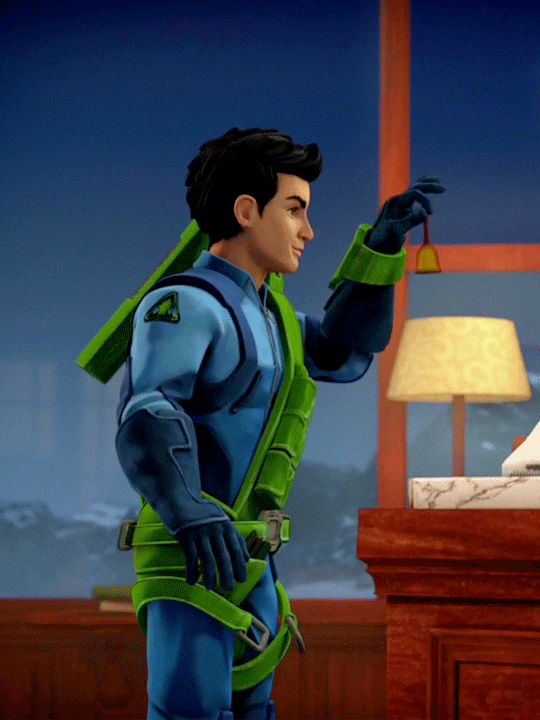
#thunderbirds are go#thunderfam#scott tracy#john tracy#virgil tracy#gordon tracy#alan tracy#lady penelope#the hood#parker#jeff tracy#brains#grandma tracy#international rescue#LOTR#TAG as LOTR#tumblr poll#because a poll is a great decision maker#gimli#aragorn#saruman#eowyn#gandalf#faramir#boromir#frodo#sam#merry#pippin
10 notes
·
View notes
Text
The politics of patriotism
THE LAST time a Democratic presidential candidate was nine points ahead in a two-horse race, less than four months from a general election, Republicans throttled him with the flag. Michael Dukakis’s alleged crime was to have vetoed a bill, as governor of Massachusetts, that would have compelled teachers to lead their pupils in the pledge of allegiance. The Democratic nominee in 1988 said he had had no choice, the bill was unconstitutional. But for his navy-hero Republican opponent, George H.W. Bush, this was a worrying reflection of the swarthy Mr Dukakis’s “values”.
He and other Republican leaders began reciting the sacred pledge at every opportunity. At the Republican convention that year John McCain, a senator and former prisoner-of-war, told a remarkable story about one of his fellow captives sewing Old Glory out of rags with a bamboo needle. Their Vietnamese captors discovered it and pulverised the flag-maker. But no sooner had he been dragged back to their communal cell, half-blind from his beating, according to McCain, than he was back at it with his bamboo splinter, “making that flag because he knew how important it was to us to be able to pledge our allegiance”.
Mr Dukakis’s subsequent hammering underlined how completely the Republicans owned patriotism (and how ruthlessly they were prepared to use it). A Harvard study found that merely exposing Americans to July 4th parades as children made them likelier to vote on the right. Is President Donald Trump ending this decades-old Republican advantage?
His efforts to capitalise on it are not subtle. He has advocated prison for flag-burners and possible deportation for black footballers who kneel during the anthem; he often accuses his critics—including racial-justice protesters in Portland—of “hating our country”. Against the wishes of service chiefs, he presided over a triumphalist military display in Washington. Such gestures would look phoney to everyone outside the president’s base even if he had not also denigrated American generals, sided with Russia against American intelligence agencies, implored Ukraine and China to intervene in American elections and in a hundred other ways run down the “big, fat, sloppy United States”, as he falsely claimed the world sees America.
Polls point to a collapse in national pride, a proxy for patriotism, during his presidency. In recent months, as America has fought a losing battle against the coronavirus, this has extended to the president’s own supporters. Mr Trump’s decision to change his campaign slogan from “Keep America Great” back to “Make America Great Again” was in that sense a response to public demand.
Yet there is more than Mr Trump going on. Even before his election Americans were starting to view patriotism in a more qualified, more Democratic way.
Where conservatives often claim to love their country uncritically—or “unambivalently”, as Ronald Reagan recommended—progressives are likelier to talk of using America’s strengths to correct its weaknesses. For John Lewis, the last titan of the civil-rights movement, non-violent protest was a patriotic act. Until recently, Democrats tended to worry more about threats to free speech than, say, clamping down on flag-burners. Political scientists call this “constructive patriotism”. In the 1930s and 1940s, when Franklin D. Roosevelt united the left and centre-right to defeat poverty and fascism, it was the dominant kind. For Adlai Stevenson, the party’s presidential nominee in the 1950s, patriotism was expressed not in “short, frenzied outbursts of emotion”, but the “tranquil and steady dedication of a lifetime”.
As the cold war loomed, he was traduced by Richard Nixon as an “appeaser”. Yet the more contingent Democratic view is coming back into vogue. Younger Americans are increasingly hostile to ostentatious flag-waving. According to one survey, two in ten millennials even consider the flag a symbol of “intolerance and hatred”. They meanwhile show no waning enthusiasm for American ideals such as equality and opportunity. They are also increasingly politically engaged; turnout among younger voters was sharply up in the 2018 mid-terms and there are indications that it will be again this year. Popular support for footballers taking a knee is consistent with this shift towards restrained national self-criticsm.
Demographic change is playing a big part in it. The armed forces—a generator and focus of patriotic fervour—were 75% white in 1990; now around 45% of their members are from mostly Democratic-voting minorities. And just as Roosevelt was able to push his values by enlarging his coalition, so the extremism of the right is expanding the left. The many veterans, of all ethnicities, who ran for the Democrats in the 2018 mid-terms proved that.
A row between Tucker Carlson, a Fox News talking-head, and Senator Tammy Duckworth encapsulated these developments. Mr Carlson accused her of hating America after she expressed willingness to debate the appropriateness of celebrating George Washington, a slave-owner. Nonsense, said Ms Duckworth, a half-Asian former army pilot: her views reflected her commitment to “every American’s right to speak out”. She had fought for her country—and lost her legs—for that, she said.
Liberty and justice
This will not be the first election in which the Democrats hope to wrest patriotism from the right. They tried in 2004, through John Kerry’s army record, and in 2016, when the spectre of Mr Trump pushed retired generals and the parents of a soldier killed in battle to Hillary Clinton. Both lost to Republican draft-dodgers. Yet Joe Biden may be a more compelling patriot.
He is not a patrician like Mr Kerry or despised as Mrs Clinton was. He is an amiable former vice-president. And, for all his weaknesses, he is good at admitting America’s failures without underselling its strengths. It will be hard to frame him as anti-American. This suggests patriotism will not be Mr Trump’s last refuge.■
This article appeared in the United States section of the print edition under the headline "Flag-rapping"
https://ift.tt/2FgBN6N
0 notes